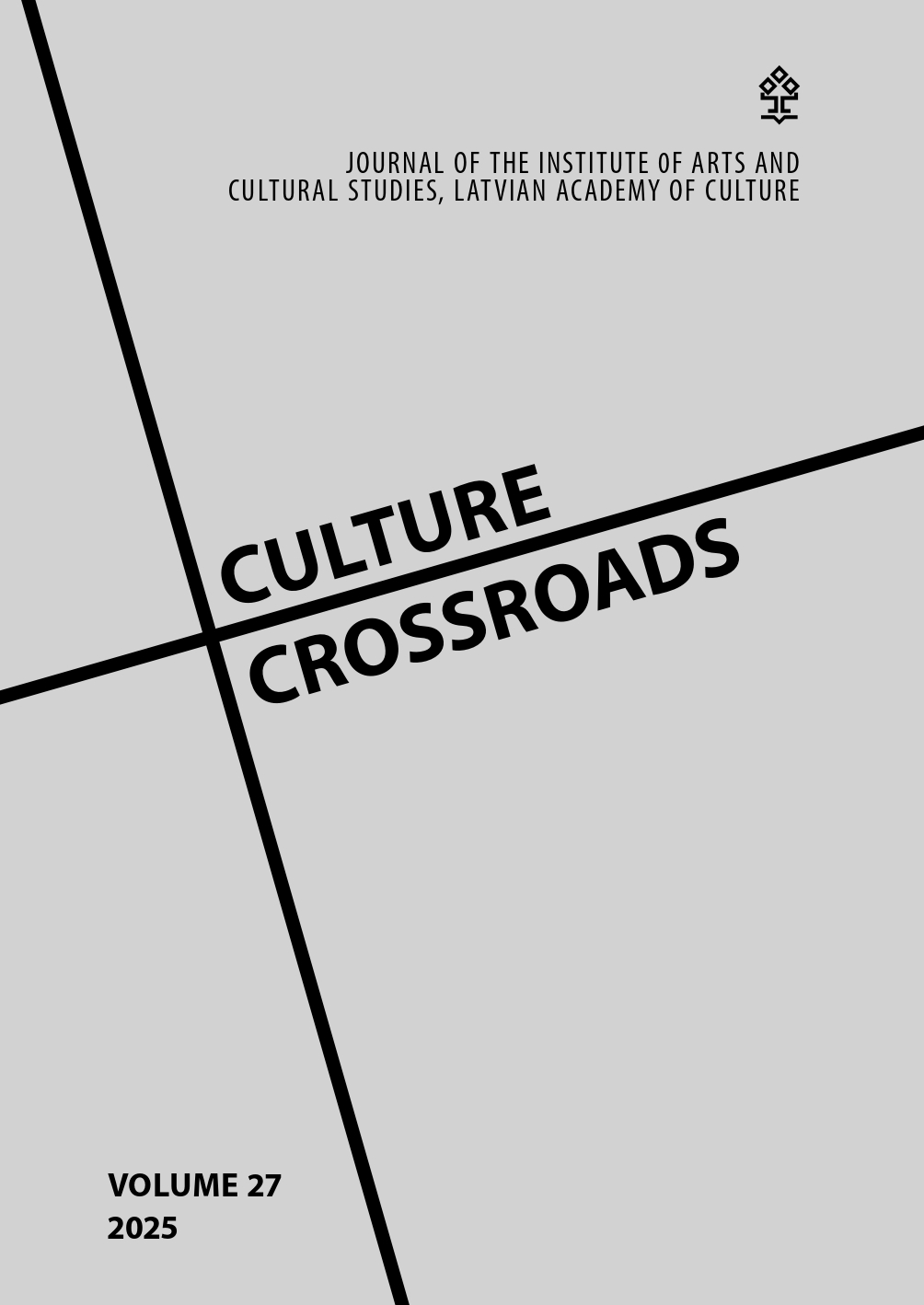Cultural and creative ecosystem of Latvia as a resource of resilience and sustainability”/CERS
Project leader: Dr.art. Rūta Muktupāvela
Project No: VPP-MM-LKRVA-2023/1-0001
Project implementation: 18.09.2023.-17.09.2026.
Project funding: 1 333 800.00 EUR
Funded by: Ministry of Culture of the Republic of Latvia
Project partners: Latvian Academy of Culture (LAC), Jāzeps Vītols Latvian Academy of Music (JVLAM), Art Academy of Latvia (AAL), National Library of Latvia (NLL), Institute of Literature, Folklore and Art of University of Latvia (ILFA)
Contacts: Project coordinator and lead researcher Dr.art. Ieva Vītola, ieva.vitola@lka.edu.lv
Project “Cultural and creative ecosystem of Latvia as a resource of resilience and sustainability” / CERS (No. VPP-MM-LKRVA-2023/1-0001) is funded by the Ministry of Culture of the Republic of Latvia in the framework of the State Research Programme “Latvian Culture – a Resource for National Development” (2023–2026). The State Research Programme is administered by the Latvian Council of Science.
The goal of the project
The goal of the projectis to create new knowledge based on an interdisciplinary research approach about the 1) manifestations of the resilience of the CCE in the current processes, especially by shedding light on the dynamics of the cultural offer and accessibility in the face-to-face and digital environment, as well as the employment and education processes of the sector; 2) the connection with historical processes, emphasizing and evaluating the role of the Soviet period to understand current culture and arts; 3) representations of the social and economic impact on the sustainable development of society. The goal will be addressed by application of three key meta-theoretical concepts: these of ecosystem, resilience and sustainability.
Summary
The project CERS (Cultural and Creative Ecosystem of Latvia as a Resource for Resilience and Sustainability) explores the arts and cultural values that are key for Latvia’s sustainable development and resilience and their contributions to cultural and creative ecosystem.
The project will explore the most important current and historical processes of Latvian culture, and the cultural and creative industries as agents of these processes.
Applying qualitative and quantitative research methods, horizontal studies and case studies, the project will analyse current tendencies in the cultural and creative industries (literature, music, theatre and dance, visual arts, design, architecture, audiovisual and film arts, traditional culture): cultural offer and access; employment and income generation patterns, the relevance of education supply to labour market demand and trends; the impact of digital technologies on cultural consumption patterns, on the processes of creating and distributing cultural content, and the generation of revenue from creative activities.
The project will develop a new knowledge base on the impact of historical processes, including the Soviet occupation period, on contemporary cultural, artistic and creative processes.
The social and economic impact of the cultural and creative industries will also be explored by increasing knowledge and understanding of the current and potential contribution and role of the cultural and creative industries in the sustainable development of the country. Particular emphasis is given to research methodologies, including the measuring of socio-economic impacts, artistic research, and digital methods.
The research quality, implementation and impact are based on the high capacity of the consortium of five research institutions (Latvian Academy of Culture, Jāzeps Vītols Latvian Academy of Music, Art Academy of Latvia, National Library of Latvia, Institute of Literature, Folklore and Art of University of Latvia), evidenced by their scholarly output, international reach, the synergy of research, academic and artistic activity, and close functional connections with policy-makers and arts/cultural practitioners. The research project proposes an in-depth and interdisciplinary view of the cultural and arts environment, creating extensive impacts for policy, cultural sector and education.
PROJECT TEAM
Rūta Muktupāvela (State research programme CERS leader)
Ieva Vītola (Project coordinator, lead project participant)
Anda Laķe (Lead project participant)
Ilona Kunda (Lead project participant)
Līga Vinogradova (Lead project participant)
Ieva Zemīte (Lead project participant)
Baiba Tjarve (Lead project participant)
Inga Pērkone-Redoviča (Lead project participant)
Agnese Hermane (Project participant)
Gints Klāsons (Project participant)
Elīna Vikmane (Project participant)
Anita Vaivade (Project participant)
Dita Rietuma ((Project participant)
Dāvis Sīmanis (Project participant)
Zane Balčus (Project participant)
Zane Kreicberga (Project participant)
Līga Ulberte (Project participant)
Ance Kristāla (Student project participant)
Sabīne Ozola (Student project participant)
Lote Katrīna Cērpa (Student project participant)
Inese Boka - Grūbe (Student project participant)
Una Bluķe (Student project participant)
Main activities of the project
Execution of the project has been divided into six work packages (WP) with particular tasks, deliverables, milestones and those responsible for implementation.
Work package 1: Current development trends in the cultural and creative industries: cultural offer and accessibility (contact persons: Anda Laķe (LAC) and Agita Gritāne (AAL))
The aim of the WP is to generate new knowledge on the creation of a diverse cultural offer, the groups of actors involved in the CCE (cultural and creative ecosystem), the linkages of these processes with the accessibility of culture and the potential for inclusive dialogue with groups at risk of exclusion from culture.
Work package 2: Current development trends in the cultural and creative industries: employment, revenue generation patterns, the correspondence of the education offer to labour market demand and trends (contact person: Ilona Kunda (LAC))
The aim of the WP is to generate new knowledge on employment patterns and forms of precarious employment in the CCSs (cultural and creative sectors) in general, in specific fields, and to compare these forms in the private and public sectors; to assess the correspondence of arts/cultural education offer to long-term labour market demand; to develop a methodology for measuring labour market demand to adapt it to the specificities of the CCSs and employment patterns.
Work package 3: The manifestations of digital technologies at different stages of the production cycle of the cultural and creative ecosystem and their impact on the patterns of consumption of culture (contact persons: Pauls Daija (NLL), Līga Vinogradova (LAC), Inese Sirica (AAL))
The objective of the WP is to generate new knowledge on the impact of digital technologies and the digital gap on people's cultural consumption habits, on the processes of creating, distributing, and preserving cultural content, and on the generation of revenue from creative work, in order to develop the digital maturity of operators in the CCE and to foster transformative resilience strategies in the sector.
Work package 4: Representation in the contemporary culture of historical processes that are significant for the Latvian cultural and creative sector (contact persons: Edīte Tišheizere (ILFA), Kristiāna Ābele (AAL), Jānis Kudiņš (JVLAM))
The objective of the WP is to develop a new knowledge base on the historical, including political-ideological, processes of the Soviet period that have a lasting impact on contemporary culture and are relevant to the resilience of the Latvian CCS ecosystem and the sustainability of society. This will be done by focusing on the processes specific to cultural and artistic sectors, as well as by identifying common trends in the manifestations of history in the context of contemporary culture.
Work package 5: Development of approaches for the assessment of the social and economic impact of cultural and creative sectors (contact persons: Ieva Zemīte (LAC), Baiba Tjarve (LAC), Liene Jākobsone (AAL))
The aim of the WP is to generate new theoretical and empirical knowledge on the current and potential contribution of CCSs to the sustainable development of society and country; to develop approaches for the assessment of the social and economic impact of CCSs, in particular on quality of life and well-being of citizens, health, education and social inclusion, environment and climate, and innovation.
Work package 6: Project Management and Synergies Across the Consortium (contact person: Ieva Vītola (LAC))
The aims and objectives of this work package are as follows:
1) to provide integration and synergies among partner’s research and academic activities to strengthen the competitiveness of the CERS interdisciplinary team;
2) to carry out the project within a set timeframe and financial framework.
PROJECT ACTIVITIES
Ieva Zemīte participates in a World Intellectual Property Organization expert visit to the Ministry of Culture
12.12.2025.
On 11–12 December, SRP project CERS researcher Ieva Zemīte took part in an expert visit of the World Intellectual Property Organization (WIPO) to the Ministry of Culture to launch the testing of the Creative Economy Data Model methodology in Latvia. During the visit, international experts shared their experience of measuring the creative economy to date, discussed measuring the creative ecosystem and the methodology of the Creative Economy Data Model. Together with Latvian partners, they analysed the availability of existing data on the creative economy and what has been studied so far, and planned the next steps in the cooperation model. The joint project will take place over a period of one and a half years in cooperation with the Central Statistical Bureau, the Smart Administration and Regional Development and the Ministry of Economics, as well as representatives of the nongovernmental sector.
On 10 December, SRP project CERS researchers Ieva Zemīte and Baiba Tjarve participated in a meeting of the Latvian Design Council at the Ministry of Culture to present the main results of the study “Identification of the Design Sector and Its Economic Activity in Latvia”.
10.12.2025.
The study was carried out under the leadership of Ieva Zemīte, leading researcher at the Latvian Academy of Culture (coauthors: Ilze Judrupa (Riga Technical University) and Baiba Tjarve (Institute of Arts and Cultural Studies of the Latvian Academy of Culture)), and its main objective is to provide a description of the economic activity of the design sector. The researchers hope that this pilot study will stimulate a broader discussion about the role and importance of design in Latvia’s national economy and in the cultural and creative industries.

At the celebrations of the 105th anniversary of the Nīca Ethnographic Ensemble, Daina Lāce from the Art Academy of Latvia presented representatives of Nīca’s cultural space with a copy of the summary of the study carried out within the SRP project CERS, "Nīcas tautastērpa kreklu uzpleču dekoratīvās kompozīcijas" (“Decorative Compositions of Shoulder Straps on Nīca Folk Costume Shirts”). Those interested can become acquainted with it at the Nīca Local History Collection (Nīcas senlietu krātuve).
06.12.2025.

Jāzeps Vītols Latvian Academy of Music student Marta Liepiņa participates in an international academic conference
06.12.2025.
On 6 December, Marta Liepiņa, firstsemester student of the Master’s academic programme in Musicology at the Jāzeps Vītols Latvian Academy of Music, took part with a paper "Valsts Rīgas Operetes / Muzikālā teātra pēdējais periods 1987–1996: jaunu institūcijas modeļu meklējumi arhīvu un periodikas liecībās" (“The Last Period of the State Riga Operetta / Musical Theatre 1987–1996: The Search for New Institutional Models in Archival and Periodical Evidence”) in the international academic conference “Jauno vēsturnieku zinātniskie lasījumi XI” (“Readings of Young Historians XI”) at the Valmiera Museum.
The conference was organized by the Valmiera Museum and the Institute of Latvian History of the Faculty of Humanities of the University of Latvia in cooperation with Vytautas Magnus University in Kaunas, the Lithuanian Institute of History and the Institute of History and Archaeology of the University of Tartu.
Participation in the conference took place as part of the research work of the SRP project “Latvia’s Cultural Ecosystem as a Resource for State Resilience and Sustainability” / CERS (VPPMMLKRVA2023/10001), funded by the Ministry of Culture of the Republic of Latvia.
More information about the conference is available here.
Foto autore Sintija Onužāne (JVLMA).

Participation of Edīte Tišheizere from the Institute of Literature, Folklore and Art of the University of Latvia in an international academic conference in the USA
02.12.2025.
In November, Edīte Tišheizere, leading researcher at the Institute of Literature, Folklore and Art of the University of Latvia, took part in the conference of the Association for Slavic, East European and Eurasian Studies in Washington, USA, with a paper “Ķermeņa valoda kā kultūras un vēstures arhīvs: Ādolfa Šapiro izrādes par totalitārismu” (“Body Language as an Archive of Culture and History: Ādolfs Šapiro’s Productions about Totalitarianism”).
The researcher analysed corporeal expressiveness and spatial organisation in director Šapiro’s trilogy from the 1980s: Bertolt Brecht’s “Fear and Misery of the Third Reich” (1985) revealed direct parallels between the Nazi and Stalinist regimes. The dramatization of Boris Vasilyev’s novel “There Was War Tomorrow” (1986) focused on Stalinist terror in the Soviet Union, while Gunārs Priede’s “Snowy Mountains” (1986) dealt with Maoism in China. At the centre of all three productions was the destruction of intellectual and ethical values and the “zombification” of the younger generation. Equating the three totalitarian regimes in the mid1980s was still a courageous act of civic resistance and also a harbinger of impending change.
Participation in the conference took place within the framework of the SRP project CERS.
More about the conference participation can be read here.

Article by Kristiāna Ābele “Tālas noskaņas vārdos, krāsās un līnijās: Rainis, Aspazija un divi latviešu gleznotāji” published in the journal Letonica
25.11.2025.
Issue 60 of the journal Letonica, “Rainis un Aspazija starp laikabiedriem Eiropas kultūrtelpā” (“Rainis and Aspazija among Contemporaries in the European Cultural Space”), published by the Institute of Literature, Folklore and Art of the University of Latvia, includes an article by Kristiāna Ābele, Director of the Institute of Art History of the Art Academy of Latvia, “Tālas noskaņas vārdos, krāsās un līnijās: Rainis, Aspazija un divi latviešu gleznotāji” (“Distant Moods in Words, Colours and Lines: Rainis, Aspazija and Two Latvian Painters”) (pp. 98–119).
The article is available here.
Issue 60 of the journal Letonica is available here.
The article was written within the framework of the SRP project CERS.

The exhibition “Dzidra Ezergaile. Kosmoss un ekslibri” opened at the National Library of Latvia
24.11.2025.
On 30 October, the National Library of Latvia opened the exhibition “Dzidra Ezergaile. Kosmoss un ekslibri”, which will be on view until 18 April 2026. The exhibition is dedicated to Latvian graphic artist and exlibrist Dzidra Ezergaile (1926–2013).
The exhibition “Dzidra Ezergaile: Cosmos and Bookplates” introduces a small selection of the artist’s bookplates and covers the period from the 1960s to the final years of her long creative life. Contemporary artist Zane Zelmene has created an audiovisual work that highlights the kinetic qualities of the motifs found in Dzidra Ezergaile’s printmaking works.
The exhibition is implemented with the support of the SRP project “Latvia’s Cultural Ecosystem as a Resource for State Resilience and Sustainability” / CERS.
More information about the exhibition opening is available here.

SRP project CERS researchers participated in the conference “Culture Crossroads” organized by the Latvian Academy of Culture
From 4 to 7 November, the Latvian Academy of Culture (LAC) hosted the international conference series “Culture Crossroads XIX”, which brought together researchers, students, policy makers, cultural professionals and representatives of the creative industries to discuss current processes in culture and the arts. On 7 November, more than 60 researchers and sector specialists shared their research findings, conclusions and proposals in six thematic sections: Performing and Audiovisual Arts; Cultural Heritage; Culture and Society; Cultural Encounters Studies and Language Use in Culture; Art, Literature and Visuality; and Philosophy in Latvia (1944–1991): Conversions and Ruptures.
The programme of the thematic sections for 7 November is available here.
SRP project CERS was represented at the conference with the following papers:
- Daina Lāce (Art Academy of Latvia, AAL), Anda Beitāne (Jāzeps Vītols Latvian Academy of Music): “Intangible Cultural Heritage as a Tool of Representation: The Case of Nīca’s Cultural Space”
- Lauma Mellēna-Bartkeviča (Jāzeps Vītols Latvian Academy of Music): “Musical Theatre at the Crossroads of Memory and Today: Can We Talk About an Immersive Experience?”
- Maija Treile (National Library of Latvia, NLL): “The Exhibition ‘Right to a Library’: How to Tell One Story Connecting Library History, Contemporary Reading Habits Research and Questions About the Future of Reading?”
- Ineta Vaivode (National Library of Latvia, NLL): “Exhibition as a Tool of Intercultural Communication: The Example of the National Library of Latvia’s Event Cycle ‘Five Hundred Years of the Latvian Book’”
- Ilona Kunda, Agnese Karlsone (Institute of Arts and Cultural Studies of the Latvian Academy of Culture): “Future Imprints in Precarious Today: The Case of Contemporary Dance”
- Līga Vinogradova, Lote Katrīna Cērpa (Institute of Arts and Cultural Studies of the Latvian Academy of Culture): “Digital Cultural Consumption Models: From Meaningful Participation to ‘Guilty Pleasure’”
- Anda Laķe (Institute of Arts and Cultural Studies of the Latvian Academy of Culture): “Cultural Services Basket: Theoretical Understanding, Practical Meaning and Implementation Issues” (paper presented at the conference “Cultural Services Basket in the Shadow of Budget Cuts” in the conference series on 4 November)
- Auguste Petre (Art Academy of Latvia, AAL): “Women’s Space: Soft Materiality in Architecture”
- Agita Gritāne (Art Academy of Latvia, AAL): “Censorship in Contemporary Art: Art – Freedom or Rights?”
- Kristiāna Ābele (Art Academy of Latvia, AAL): “Analysis and Synthesis of Small-Town Views in Vilhelms Purvītis’ Series of Paintings”
- Agnese Strautiņa (Art Academy of Latvia, AAL): “Postmodernism in Soviet Everyday Life: Interiors of Riga Cafés and Restaurants in the 1980s”

On 4 November, as part of the conference series “Culture Crossroads” organized by the Latvian Academy of Culture, the conference “Cultural Services Basket in the Shadow of Budget Cuts” took place.
The conference “Cultural Services Basket in the Shadow of Budget Cuts” discussed the possibilities for implementing the cultural services basket concept in Latvian municipalities. In panel discussions, experts, policy makers and municipal representatives looked for solutions to ensure the diversity and continuity of cultural processes at a time when budgetary and security priorities restrict resources.
The following panel discussions were held as part of the conference:
Culture makers in Latvian cities and regions: between budgets, public taste and creative courage
The private sector in Latvian cultural life: investment, audience and future opportunities
Culture in municipalities in the context of budget cuts: surviving or growing and inspiring?
The video recording of the conference is available here.

SRP Project CERS Researchers Participate in the Conference Series "Culture Crossroads" organized by the Latvian Academy of Culture
From November 4–7, the Latvian Academy of Culture (LAC) will host the international conference series Kultūras Krustpunkti XIX (Culture Crossroads XIX), which will traditionally bring together researchers, students, policy makers, cultural professionals, and representatives of the creative industries to discuss the most current processes in culture and the arts.
On November 7 at LKA Gara House (Miera Street 58a), starting at 9:30 a.m., more than 60 researchers and specialists will share their research results, findings, and recommendations in six thematic sections: Performing and Audiovisual Arts; Cultural Heritage; Culture and Society; Cultural Encounters and Language in Culture; Art, Literature and Visuality; and Philosophy in Latvia (1944–1991): Conversions and Ruptures.
The program for the November 7 thematic sections is available here.
SRP Project CERS was represented at the conference with the following papers:
- Daina Lāce (AAL), Anda Beitāne (JVLMA): "Intangible Cultural Heritage as a Tool of Representation: The Case of Nīca's Cultural Space"
- Lauma Mellēna-Bartkeviča (JVLMA): "Musical Theatre at the Crossroads of Memory and Today: Can We Talk About an Immersive Experience?"
- Maija Treile (NLL): "The Exhibition 'Right to a Library': How to Tell One Story Connecting Library History, Contemporary Reading Habits Research, and Questions About the Future of Reading?"
- Ineta Vaivode (NLL): "Exhibition as a Tool of Intercultural Communication: The Example of the National Library of Latvia's Event Cycle 'Five Hundred Years of the Latvian Book'"
- Ilona Kunda, Agnese Karlsone (LAC): "Future Imprints in Precarious Today: The Case of Contemporary Dance"
- Līga Vinogradova, Lote Katrīna Cērpa (LAC): "Digital Cultural Consumption Models: From Meaningful Participation to 'Guilty Pleasure'"
- Anda Laķe (LAC )"Cultural Services Basket: Theoretical Understanding, Practical Meaning, and Implementation Issues" (Paper presented at the conference series conference "Cultural Services Basket in the Shadow of Budget Cuts" on November 4)
- Auguste Petre (AAL): "Women's Space: Soft Materiality in Architecture"
- Agita Gritāne (AAL): "Censorship in Contemporary Art: Art — Freedom or Rights?"
- Kristiāna Ābele (AAL): "Analysis and Synthesis of Small-City Views in Vilhelm Purvītis's Series of Paintings"
- Agnese Strautiņa (AAL): "Postmodernism in Soviet Everyday Life: Interiors of Riga's Cafés and Restaurants in the 1980s"
Conference "Cultural Services Basket in the Shadow of Budget Cuts"
On November 4, at the conference series Kultūras Krustpunkti (Culture Crossroads) organized by the Latvian Academy of Culture, the LAC National Film School pavilion (Miera Street 58a) will host the conference Kultūras pakalpojumu grozs budžeta izdevumu samazināšanas ēnā (Cultural Services Basket in the Shadow of Budget Cuts) from 10:00 to 18:00.
The conference will discuss opportunities for implementing the cultural services basket concept in Latvian municipalities. In panel discussions, experts, policy makers, and municipal representatives will seek solutions for ensuring the diversity and continuity of cultural processes in a time when budget and security priorities constrain resources.
Information on the planned panel discussions:
Panel 1: Culture Makers in Latvian Cities and Regions: Between Budgets, Public Taste, and Creative Courage (13:00–14:30)
- Moderator: Henrieta Verhoustinka
- Participants: Krista Vīndedze, Diāna Soldāne, Mintauts Buškevics, Dārta Vilne, Liene Kubiļus, Ieva Šaudena
Panel 2: The Private Sector in Latvian Cultural Life: Investment, Audience, and Future Opportunities (14:45–16:15)
- Moderator: Gustavs Terzens
- Participants: Juris Millers, Guntars Račs, Egīls Šēfers, Iveta Lāce, Agnese Cimuška-Rekke
Panel 3: Culture in Municipalities in the Context of Budget Cuts: Surviving or Growing and Inspiring? (16:30–18:00)
- Moderator: Anete Ašmane-Vilsone
- Participants: Toms Upners, Gunārs Ansiņš, Andrejs Elksniņš, Dāvids Rubens, Leons Līdums, Viesturs Kleinbergs
The full conference program is available here.

On October 30, the National Library of Latvia opened the exhibition "Dzidra Ezergaile. Cosmos and Bookplates," which will be on view until April 18, 2026.
29.10.2025
The exhibition Dzidra Ezergaile. Kosmoss un ekslibri (Dzidra Ezergaile: Cosmos and Bookplates) is dedicated to Latvian graphic artist and exlibrist Dzidra Ezergaile (1926–2013), and features a selection of the artist's bookplates spanning the period from the 1960s through the final years of the artist's long creative career. Contemporary artist Zane Zelmene has created an audiovisual work that highlights the kinetic qualities of the motifs found in Dzidra Ezergaile's graphic works.
The exhibition is implemented with the support of the State Research Program project CERS.
More information about the exhibition is available here.
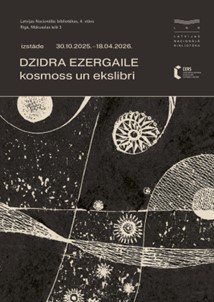
The Evaluation Report for the First 18 Months of the SRP Project CERS has been published, in which independent foreign experts have assessed the project's scientific and social impact, recommending the continuation of the project.
16.10.2025
It is commended that through the project, with the cooperation of five research and culture institutions (the Latvian Academy of Culture, the Art Academy of Latvia, the National Library of Latvia, the Jāzeps Vītols Latvian Academy of Music, and the Institute of Literature, Folklore and Art of the University of Latvia), significant investment has been made in developing cultural policy and research capacity during the first 18 months. The project's research quality has been highly valued, as has the broad involvement of students and collaboration with industry professionals and policy makers.
To date, in the SRP project CERS:
- Historical, qualitative, quantitative, and participatory methods have been combined, including the implementation of innovative approaches such as the cultural consumption diary tool and focus groups.
- Cross-sectoral policy recommendations have been developed, and work has been undertaken on data collection regarding cultural accessibility, employment, and education in the cultural and creative industries sector.
- The impact of Soviet-era art and culture on the present day has been studied, emphasizing insufficiently researched materials and regional perspectives.
- The social and economic impact of the cultural and creative industries sector has been analyzed.
- Students and industry professionals have been actively involved, strengthening the synergy between research and education.
The evaluation report is available here.
The SRP Project CERS Closing Conference is expected in September 2026!
10.10.2025
After three years of work, the SRP project CERS will conclude in September 2026. We invite you to mark your calendars in advance for the project closing conference, which will take place on September 9–11, 2026.
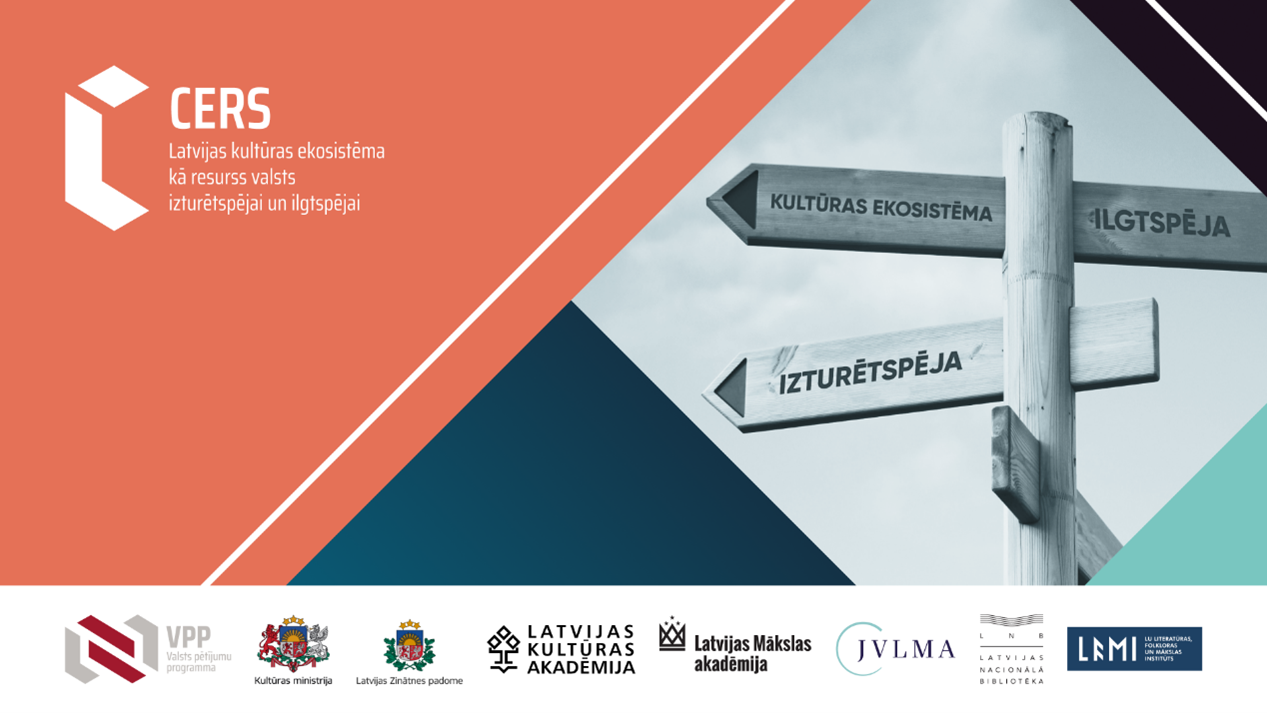
The SRP Project CERS Implementation Team Networking Event has concluded!
09.10.2025
On October 8, 2025, at the new venue of the Latvian Academy of Culture on Miera Street, implementers of the State Research Program project Latvijas kultūras ekosistēma kā resurss valsts izturētspējai un ilgtspējai (Latvia's Cultural Ecosystem as a Resource for State Resilience and Sustainability) / CERS gathered for a networking workshop.
The SRP project CERS is implemented by a consortium of five scientific institutions, consisting of the Latvian Academy of Culture (LKA, lead partner), the Jāzeps Vītols Latvian Academy of Music (JVLMA), the Art Academy of Latvia (AAL), the National Library of Latvia (NLL), and the Institute of Literature, Folklore and Art of the University of Latvia (LU LFMI). Over the course of three years, more than 70 researchers and students from the humanities and social sciences have been employed on the project. The project, which began in September 2023, is approaching completion. During the seminar, researchers and institutional representatives shared experiences from the work completed and discussed current developments while implementing a range of different sub-studies and preparing results including scientific articles, monographs, reports and recommendations for cultural policy makers, datasets, master's theses, doctoral dissertations, and more.
As part of the event, participants had the opportunity to visit the new premises of the Institute of Arts and Cultural Studies of the Latvian Academy of Culture, the National Film School, and the exhibition Uzburt pasaules. Latvijas filmu māksliniekI (Conjure Worlds: Latvian Film Artists) at the Latvian Cinema Museum — thank you to Inga Pērkone and Lāsma Bērtule!
Looking forward to seeing you on September 9–11, 2026, when the SRP project CERS closing conference will take place!
Survey questionnaire design and respondent selection for the study on creative employment
24.09.2025.
Throughout the summer, nearly every week, the team held active and productive discussions on developing a survey questionnaire for a study on employment models and precarious employment manifestations among creative professionals, including issues of social protection, fair remuneration, and artistic freedom challenges in the cultural and creative sectors.
Team members reviewed a wide range of previous studies from Latvia and abroad and analyzed different methodological approaches to ensure the developed study instruments are relevant and understandable for respondents from different employment models and sectors. It is well known that the considerable variety within the cultural and creative sector presents a particular challenge for quantitative research.
Starting from the last week of August, the project team also began working to ensure the survey reaches as broad a group of respondents as possible, including copyright recipients and creative professionals working in the private sector.
Two especially significant organizations in the cultural and creative sector – AKKA/LAA (Copyright and Communication Consulting Agency/ Latvian Authors Association) and the Latvian Creative Unions Council – demonstrated considerable responsiveness and interest in carrying out this task. Collaboration with these organizations, both in refining the questionnaire and in reaching respondents, is invaluable.
On August 27, project team representatives Prof. Anda Laķe and Assoc. Prof. Ilona Kunda met with Anita Sosnovska, Deputy Executive Director and Head of the Documentation and Distribution Department, and Ieva Kolmane, Public Relations Specialist, at the AKKA/LAA office. On August 28, Assoc. Prof. Ilona Kunda and research assistant Agnese Karlsone met with Inga Brūvere, Chairwoman of the Board of Latvian Creative Unions Council, and Santa Hirša, Secretary General of Latvian Creative Unions Council The valuable partner consultations have been crucial for improving the survey questionnaire.
It is expected that the survey will be implemented in October this year.
Institute of Arts and Cultural Studies, Latvian Academy of Culture representatives Rūta Muktupāvela and Anda Laķe participated in the European Sociological Association's Sociology of the Arts research network midterm conference
10.09.2025.
On September 8–9 in Barcelona, Spain, the representatives of the Institute of Arts and Cultural Studies, Latvian Academy of Culture, Rūta Muktupāvela and Anda Laķe, participated in the 13th midterm conference of the European Sociological Association’s Sociology of the Arts research network.
A paper titled "Art literacy as a prerequisite and barrier to the development of a professional art audience: an example of academic music," prepared within the SRP project CERS, was presented at the conference.
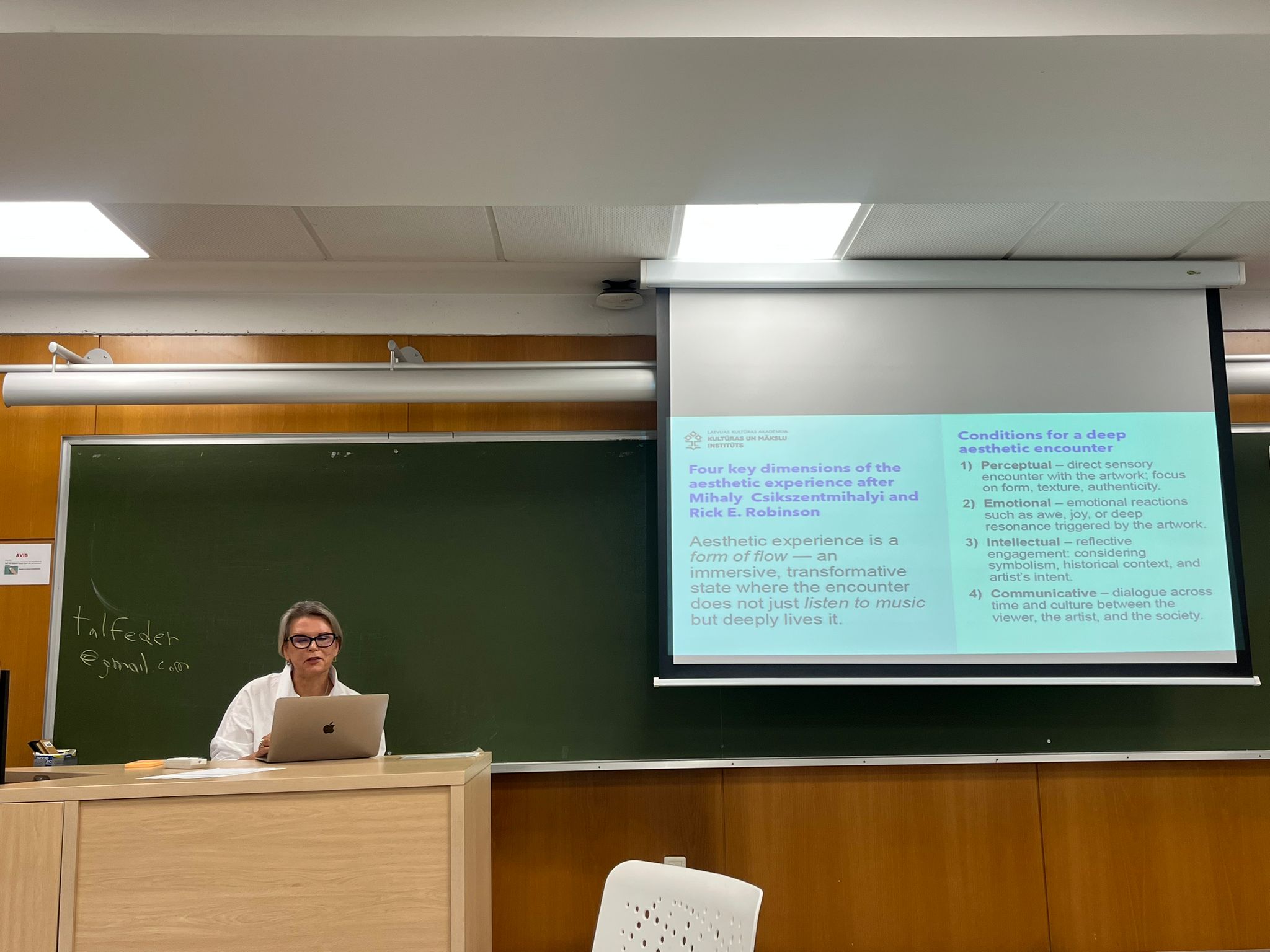
The analysis of the cultural consumption diaries within the SRP project CERS has been completed!
08.09.2025.
This summer, Līga Vinogradova and Lote Katrīna Cērpa from the Institute of Arts and Cultural Studies concluded the analysis of cultural consumption diaries carried out as part of the SRP project CERS. At the end of last year, participants from across Latvia were sought who would be willing to keep a cultural consumption diary—including digital activities—for one month. Given the time-consuming nature of this task and its long-term collaborative format, the researchers are delighted with the engagement and interest this project has sparked! In total, 20 cultural consumption diaries and 20 in-depth interviews conducted after diary completion were analyzed.
More information is available here
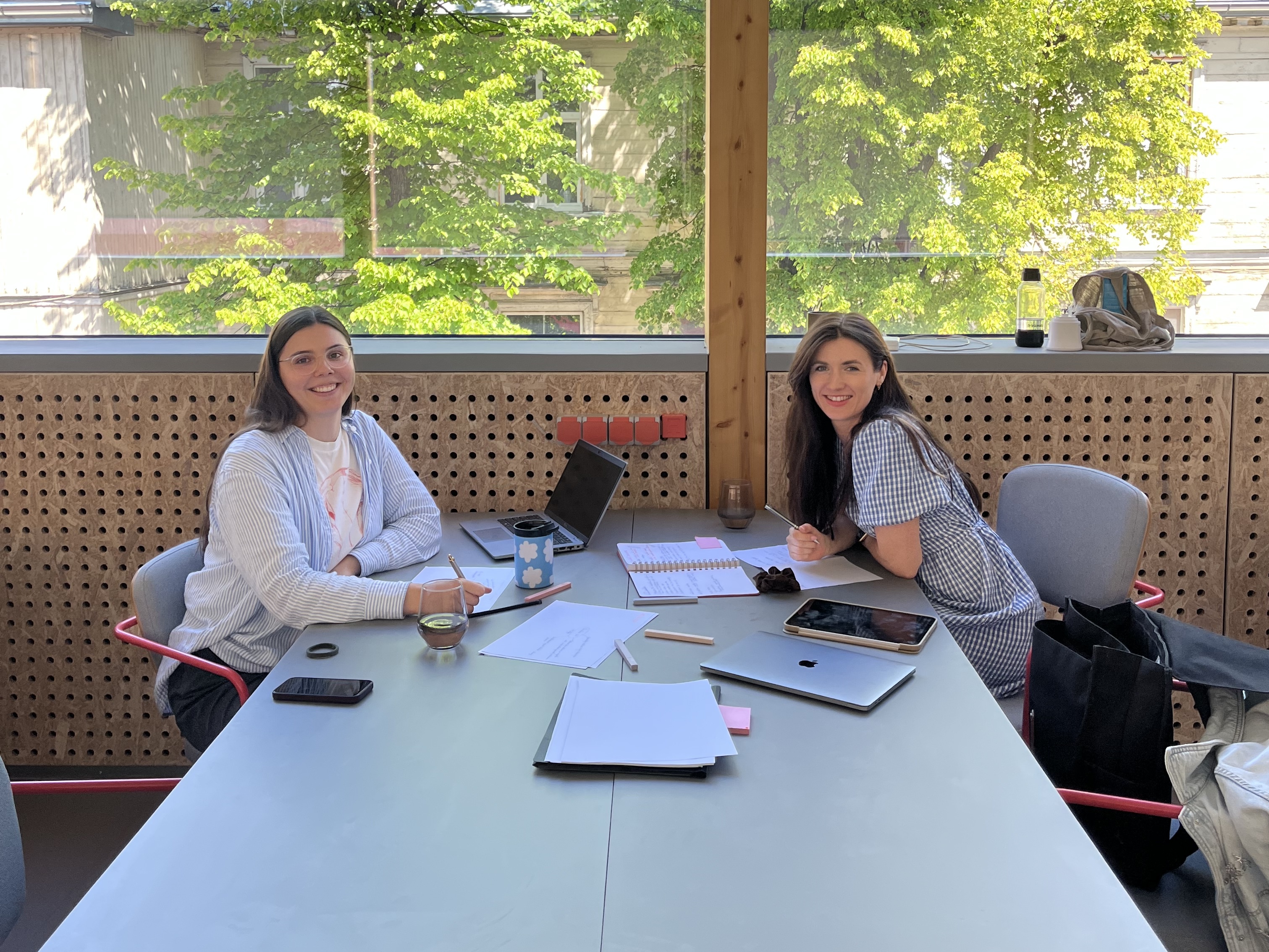
From July 28 to August 1 (2025), the National Library of Latvia and the Art Academy of Latvia jointly organized a summer school entitled "Curatorial Strategies: Research and Experimentation"!
Here is a brief overview of the summer school, compiled by the National Library of Latvia.
The aim of the summer school was to draw attention to processes that explore the role of the curator in contemporary art and memory institutions in Latvia.
The summer school offered a look at curatorial practice both as a field of research and as a space for creative experimentation that promotes an inclusive and diverse cultural environment.
The summer school and its public program were implemented as part of the SRP project CERS.
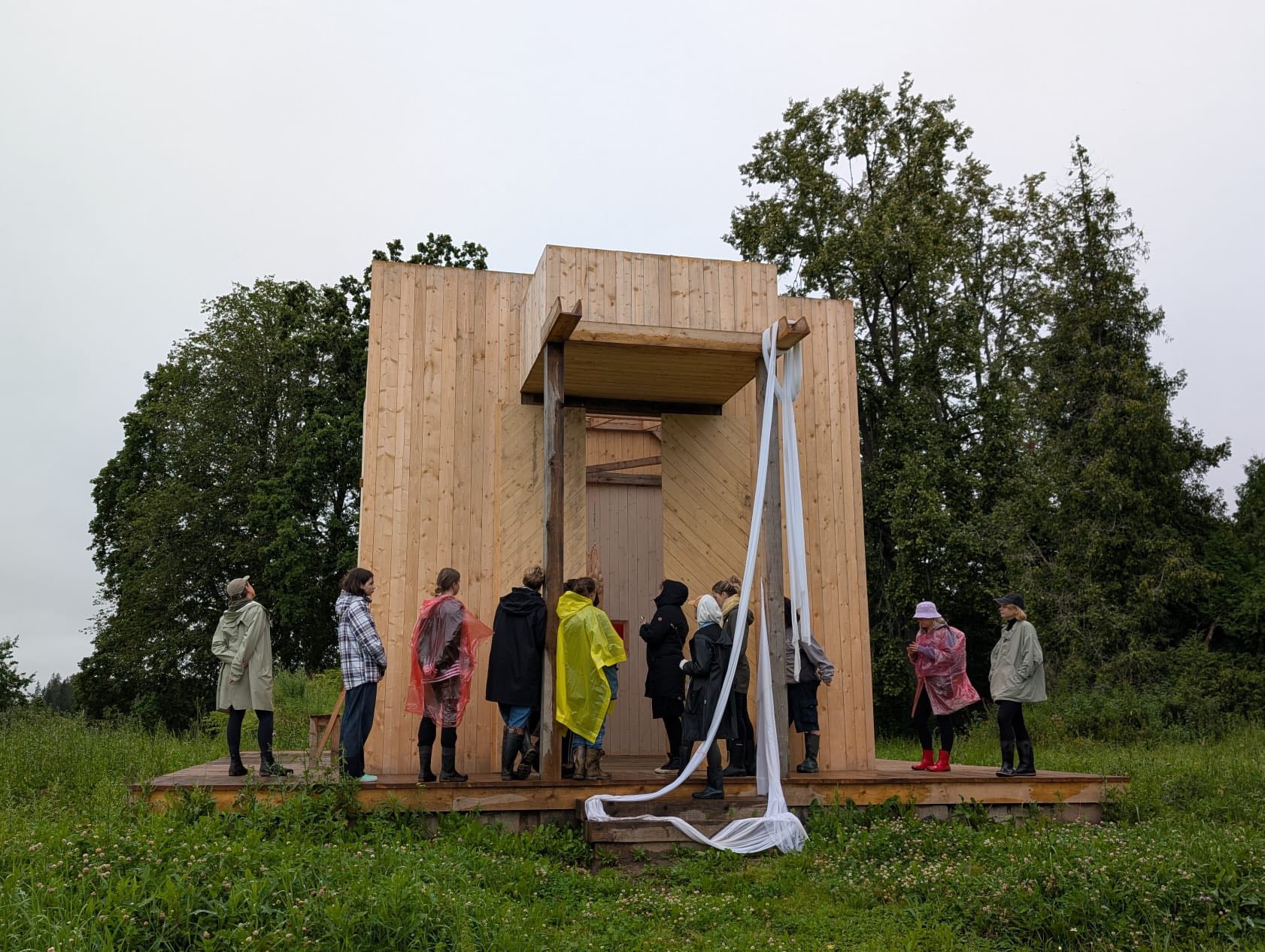
From July 6 to 11, Sabīne Ozola, research assistant at the Latvian Academy of Culture's Institute of Arts and Cultural Studies, participated in the 5th Sociology Forum of the International Sociological Association in Rabat, Morocco.
14.07.2025.
In the paper "Promoting art literacy among rural residents as a prerequisite for diversity in cultural services" (authors: Anda Laķe, Agnese Hermane, Rūta Muktupāvela, Sabīne Ozola), which was developed as part of the SRP project CERS, presented findings on the role of artistic literacy in promoting cultural diversity in rural areas.
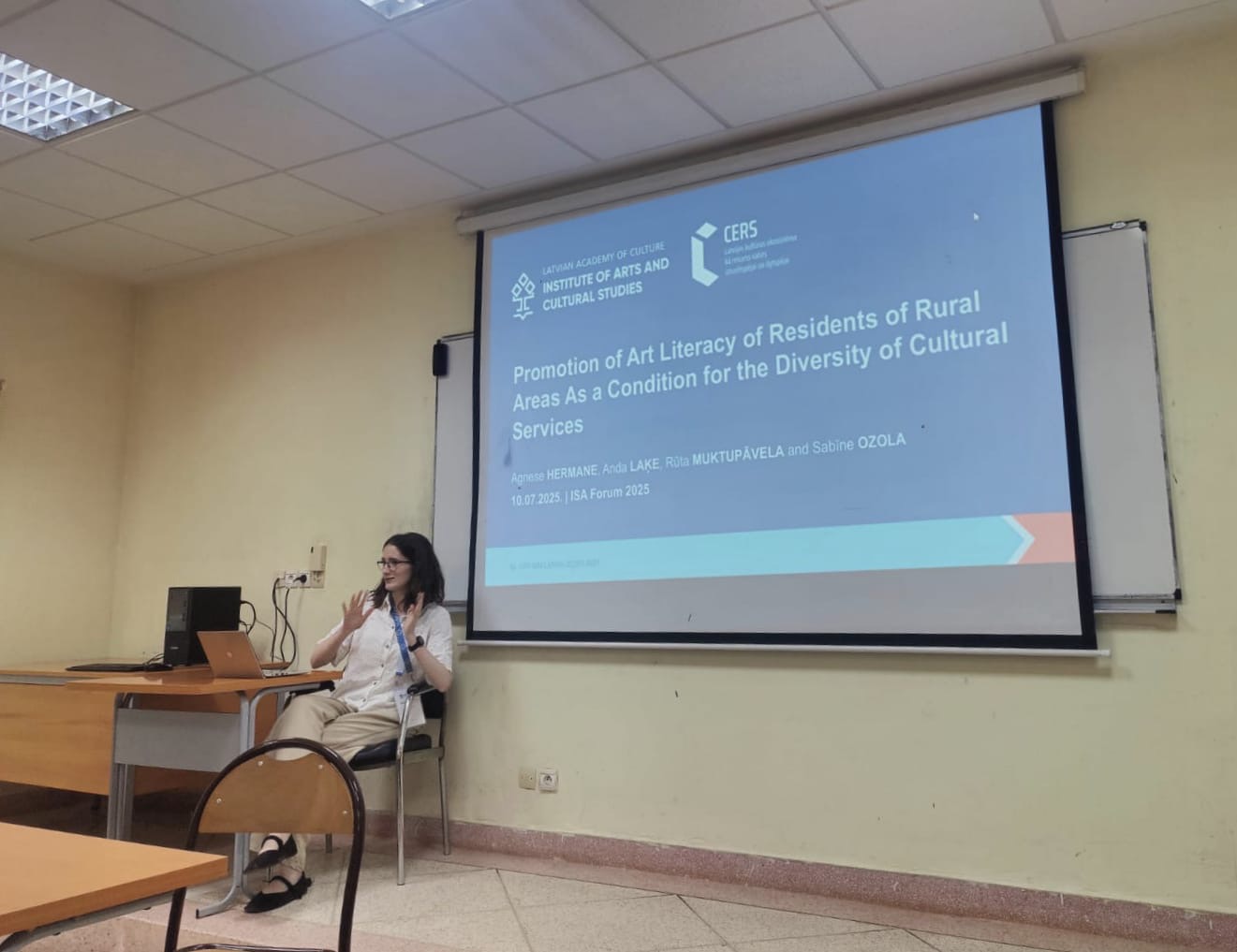
From June 24 to 27, 2025, Erasmus University Rotterdam hosted the 23rd International Conference on Cultural Economics (ACEI 2025), where Ieva Zemīte, a leading researcher at the Latvian Academy of Culture, gave a presentation.
01.07.2025.
At the conference, Ieva presented a paper entitled "Challenges in Measuring Social and Economic Impact of Grassroots Cultural Initiatives: Stories from Latvia," which was written in collaboration with her colleague Baiba Tjarve.
This presentation is a small part of the SRP project CERS work direction, which is dedicated to researching the social and economic impact of cultural and creative initiatives.
The presentation took place during the thematic session "Cultural Places and Policy," which brought together researchers from various countries to discuss the challenges associated with the development of cultural places, policy frameworks, and impact assessment.
Participation in the ACEI conference provided a valuable opportunity to present Latvia's experience and highlight the challenges of measuring social impact in academic discussion.
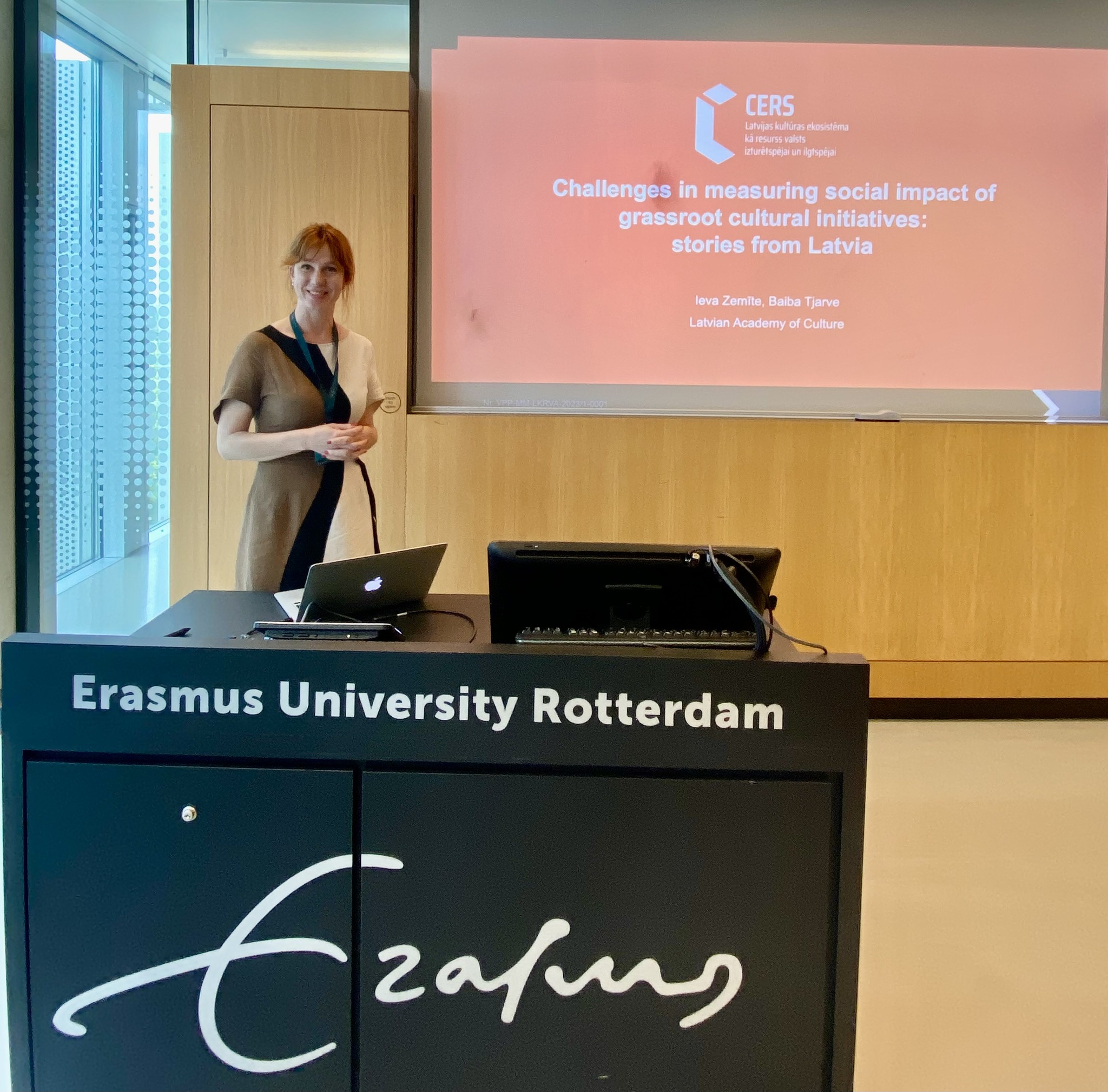
Research article published on the reception history of the Latvian patriotic song, based on Czech national poetry, up to the 21st century
01.07.2025.
A study by Professor Jānis Kudiņš of the Jāzeps Vītols Latvian Academy of Music, SRP project CERS principal investigator, has been published in the musicology journal Musicologica Brunensia (Brno Masaryk University, Czech Republic; indexed in SCOPUS). The article explores the reception history of the patriotic song Nevis slinkojot un pūstot ("Not by idling and lazing about") in Latvia up to the 21st century. The publication clarifies facts about the song’s textual roots in a poem by Czech national poet František Čelakovský (in a free translation by Juris Alunāns) and the creation of the final version of the text (with an appended Auseklis toast) in the circumstances of Andrejs Jurjāns’s 19th-century composition. It describes the processes by which the song became embedded in the cultural memory of society during various historical periods. The phenomenon of the song’s popularity during the Third Awakening in the 1980s, as well as its representation in various spheres including contemporary popular music culture, is emphasized.
The publication is available here.
Special Issue of the Journal Culture Crossroads has been Published on Audiovisual Archives, Digital Platforms, and Audiences
27.06.2025.
The latest thematic issue (Vol. 27) of Culture Crossroads, the international scholarly journal published by the Institute of Arts and Cultural Studies of the Latvian Academy of Culture, has been published titled “Exploring the Past and Future of Audiovisual Media in the Baltic Sea Region: Archives, Digital Platforms, Researchers and Spectators.” The articles by internationally recognised and nationally significant scholars are based on papers presented at the 9th Baltic Sea Region Film History Conference, held in Riga in 2024.
The volume is structured in two sections – Platforms and Spectators and Archives – highlighting how digital platforms increasingly serve archival functions, while archives are expanding their roles as active cultural mediators.
The volume has been published within the framework of the research project "Cultural and creative ecosystem of Latvia as a resource of resilience and sustainability"/ CERS (VPP-MM-LKRVA-2023/1-0001), which is funded by the Ministry of Culture of the Republic of Latvia in the framework of the State Research Programme “Latvian Culture – a Resource for National Development” (2023–2026). The State Research Programme is administered by the Latvian Council of Science.
The special issue is available here - https://culturecrossroads.lv/index.php/cc/issue/view/35
Discussion on folk costumes at the LAMPA conversation festival
26.06.2025.
This summer, CERS researcher Daina Lāce moderated the discussion “The Folk Costume – Cultural Canon or Creative Experiment?” at the LAMPA festival.
Participants included:
– Linda Rubena, representative of the Latvian National Centre for Culture;
– Gatis Krūmiņš, lead researcher at Vidzeme University of Applied Sciences,
– Evita Lisovska, representative of the association “Mans tautastērps”,
– Iveta Lazdāne-Pētersone, chief conductor of the Latvian Dance Celebration.
Many thanks to Daina Lāce for initiating, organizing, and moderating the discussion!
Photo – Daina Lāce’s personal archive.
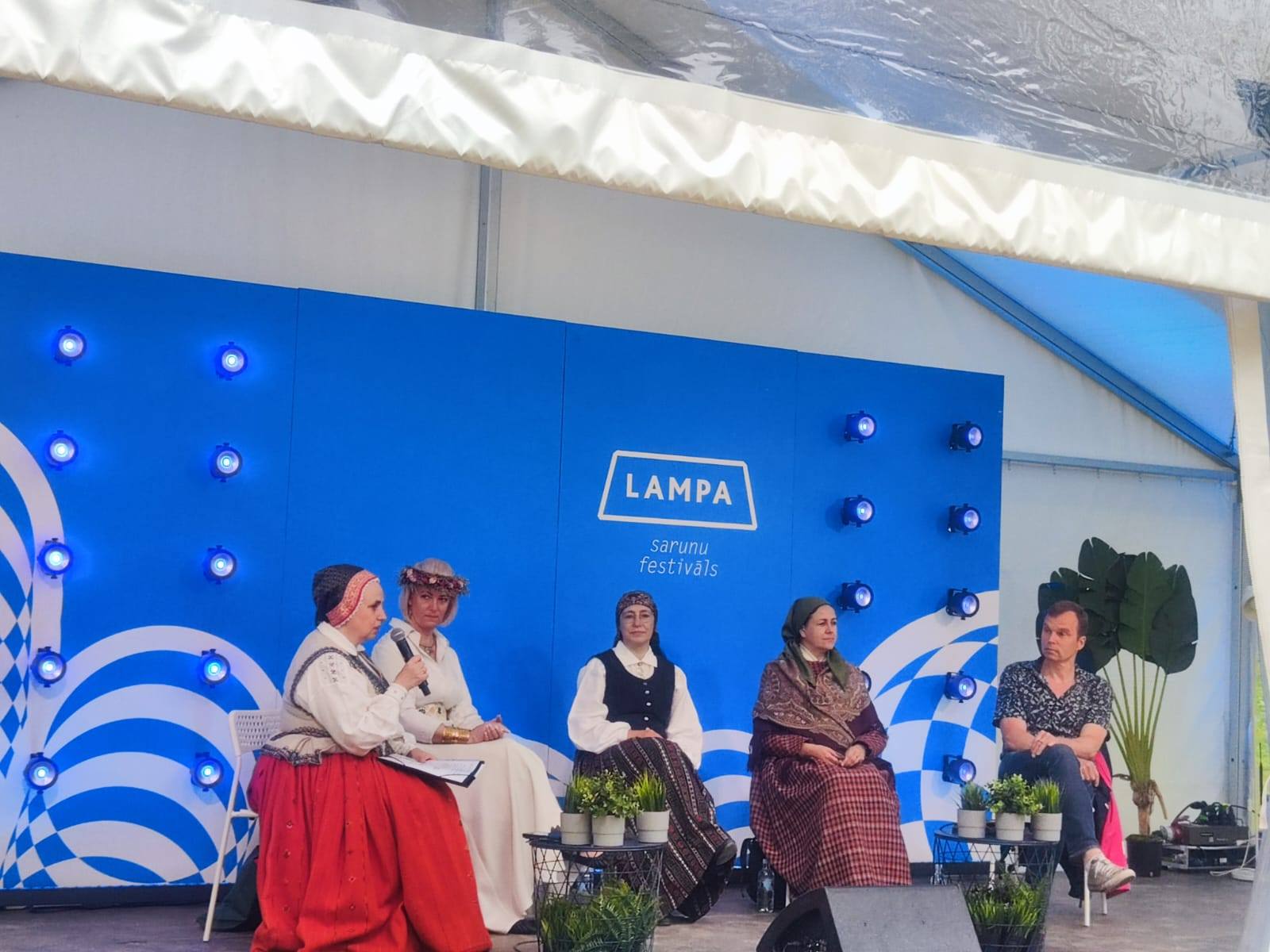
ILFA researcher Kitija Balcare at an international conference
From 16 to 19 June, ILFA researcher Kitija Balcare participated in the conference of the International Society for Cultural History “Human/Nature – Entanglements in Cultural History”, held at the University of Lapland, Rovaniemi, Finland.
She presented the paper “Cartography of the Ecotheatre: Disappeared, Disappearing and Imaginary Landscapes”.
More information about the conference is available here.
Lecture by Kristiāna Vaickovska: “Lūcija Garūta’s A Cappella Choral Music: The Clash of Soviet Ideology and the Composer’s Universal Outlook”
11.06.2025.
On 11 June, the Museum of the Occupation of Latvia hosted the event “An Hour with Lūcija Garūta”. The one-hour event included speeches and a lecture on Lūcija Garūta, with performances of her a cappella works by the University of Latvia Chamber Choir “DeCoro” (conductors – Kristiāna Vaickovska and Pēteris Vaickovskis).
At the event, JVLAM representative Kristiāna Vaickovska delivered the lecture “Lūcija Garūta’s A Cappella Choral Music: The Clash of Soviet Ideology and the Composer’s Universal Outlook”.
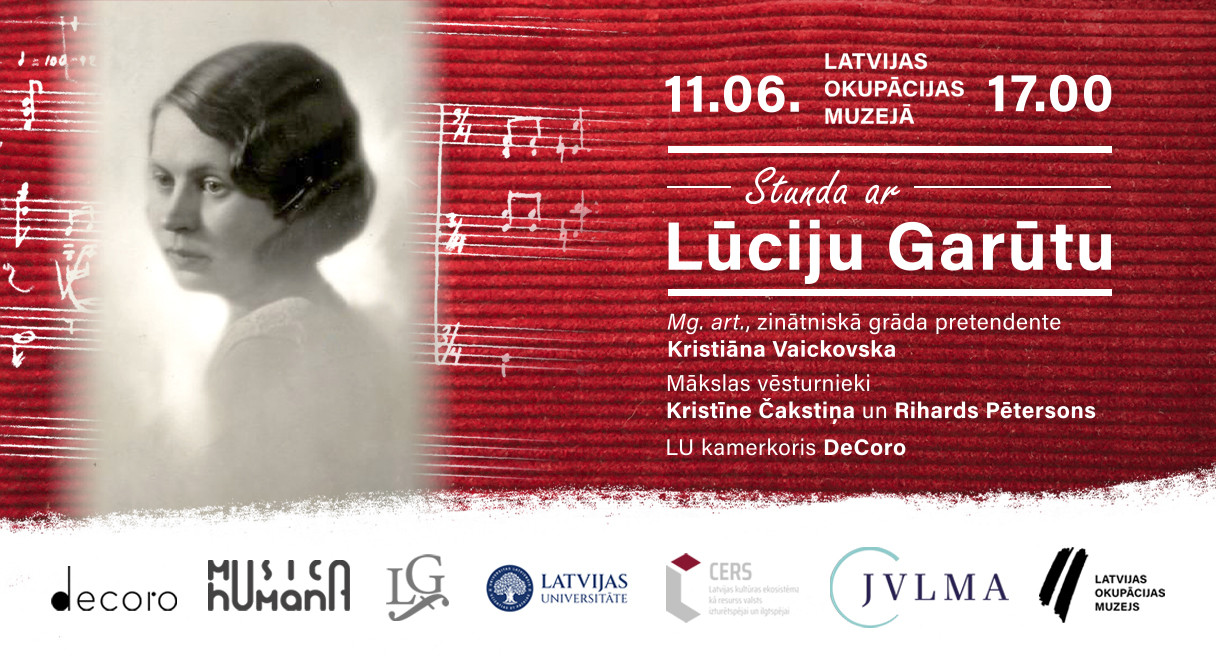
An article by SRP project CERS researcher Zita Kārkla (in collaboration with Jana Kukainis) has been published in the journal Women’s Studies (Scopus Q3): "Feral Intimacy: Feminist Transformations Through Solitary Forest Walks."
09.06.2025.
The article is available here.
Exchange of views with cultural policymakers on the precarious employment of cultural and creative sector professionals
03.06.2025.
On 3 June, at the Great Hall of the Ministry of Culture of the Republic of Latvia, a meeting was held with cultural policymakers. Participants included Deputy State Secretary for Cultural Policy Issues Baiba Mūrniece, as well as the heads and staff of the Creative Industries, Cultural Policy, and Cultural Education Departments.
From the project side, Prof. Anda Laķe and Assoc. Prof. Ilona Kunda took part. The aim of the meeting was to identify current issues of the Ministry of Culture regarding employment, social protection, and education in the cultural and creative sector, in order to more precisely shape the further work of the CERS project within Work Package 2.
During the discussion, several thematic areas were identified where the Ministry would be interested in obtaining additional data: for example, on the use of artificial intelligence in the cultural and creative sector, gender inequality in remuneration, the effectiveness of social protection for creative professionals, and others.
The project team highly valued the insightful exchange. The results of the meeting will be used in developing the research instruments for Work Package 2.
Report prepared by Ilona Kunda
Summer school call for applications!
03.06.2025.
The National Library of Latvia (NLL) and the Art Academy of Latvia (AAL) invite students to apply for the summer school “Curatorial Strategies: Research and Experiment”, to be held from 28 July to 1 August 2025.
The summer school is dedicated to the role of the curator in contemporary art – from the perspective of both research and creative experimentation. The programme includes lectures, workshops, and discussions with international and local professionals. Among the guest lecturers will be Lucy Steeds, Andris Brinkmanis, Miks Wilson, Solvita Krese, Ineta Vaivode, Kaspars Vanags, and others.
The summer school is intended for students interested in art and cultural research. Upon successful completion of the final seminar assignment, participants can obtain 2 ECTS credits as an elective course.
Applications are open until 26 June by sending a motivation letter and CV to: vasarasskola2025@lma.lv
More information: https://vasarasskola2025.lnb.lv/
The public programme will be available on 28 July and 1 August for all interested parties. The summer school is organized within the framework of the CERS project.
Photo – Kate Švinka. AAL Curator specialty summer school in Savvaļa, 2024
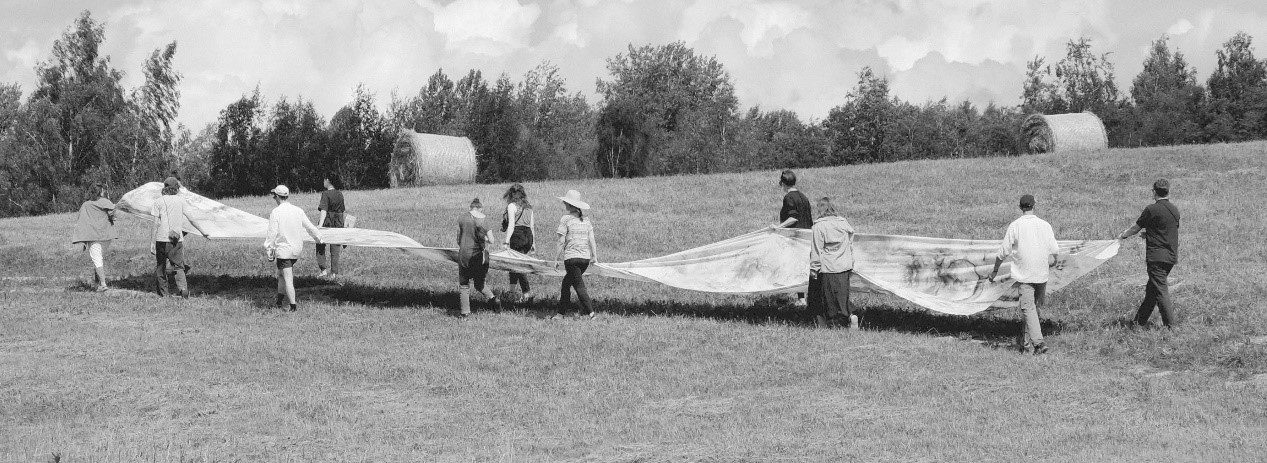
Book launch of “Introduction to Narratology”
02.06.2025.
On 29 May, the book launch of “Introduction to Narratology” by ILFA researcher Jānis Ozoliņš took place at the “Neiburgs” restaurant.
Congratulations to the author on the publication of his monograph!
The book was developed within the CERS project.
A photo overview of the launch event is available here.
Upcoming discussion at the LAMPA festival: “The Folk Costume – Cultural Canon or Creative Experiment?”
01.06.2025.
This summer, CERS researcher Daina Lāce will lead a discussion at the LAMPA festival in Cēsis on “The Folk Costume – Cultural Canon or Creative Experiment?”.
The discussion will address questions of authenticity of folk costumes in today’s context – the Song and Dance Festival is the cornerstone of Latvia’s cultural identity, but how authentic are the costumes of its participants? Do they preserve ancient traditions, or are they instead becoming interpretations and stylized compromises in the name of modern practicality? Can the traditional craftsmanship skills of making folk costumes survive in the digital age?
The discussion is organized by the Institute of Art History of the Art Academy of Latvia (AAL) in cooperation with the Latvian National Centre for Culture.
Moderator: Daina Lāce
Participants: Linda Rubena, Gatis Krūmiņš, Evita Lisovska, Iveta Lazdāne-Pētersone
More information available here.
Photo – Daina Lāce’s personal archive.
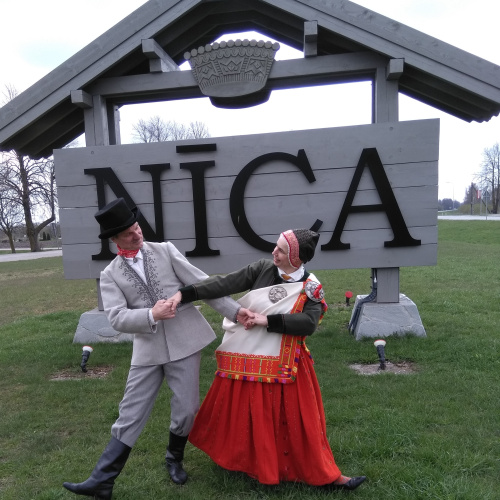
Within the framework of the CERS project, the Art Academy of Latvia (AAL) held its 5th international academic conference “MYTH – ARCHETYPE – PROTOTYPE AND ITS (RE)INTERPRETATION” on 29–30 May.
31.05.2025.
This annual conference gathered more than 45 speakers from various European countries.
Conference programme available here.
Among the thematic sessions organized by Liene Jākobsone (AAL) were several devoted to research on design impact: “Understanding Design Impact: Theory and Practice”, “Collaboration for Design Impact Assessment”, and “Case Studies”. These brought together design researchers not only from Latvia but also from Italy, India, Turkey, the Netherlands, Denmark, Finland, Hungary, Slovakia, Japan, and the UK.
Photo – Art Academy of Latvia (AAL)
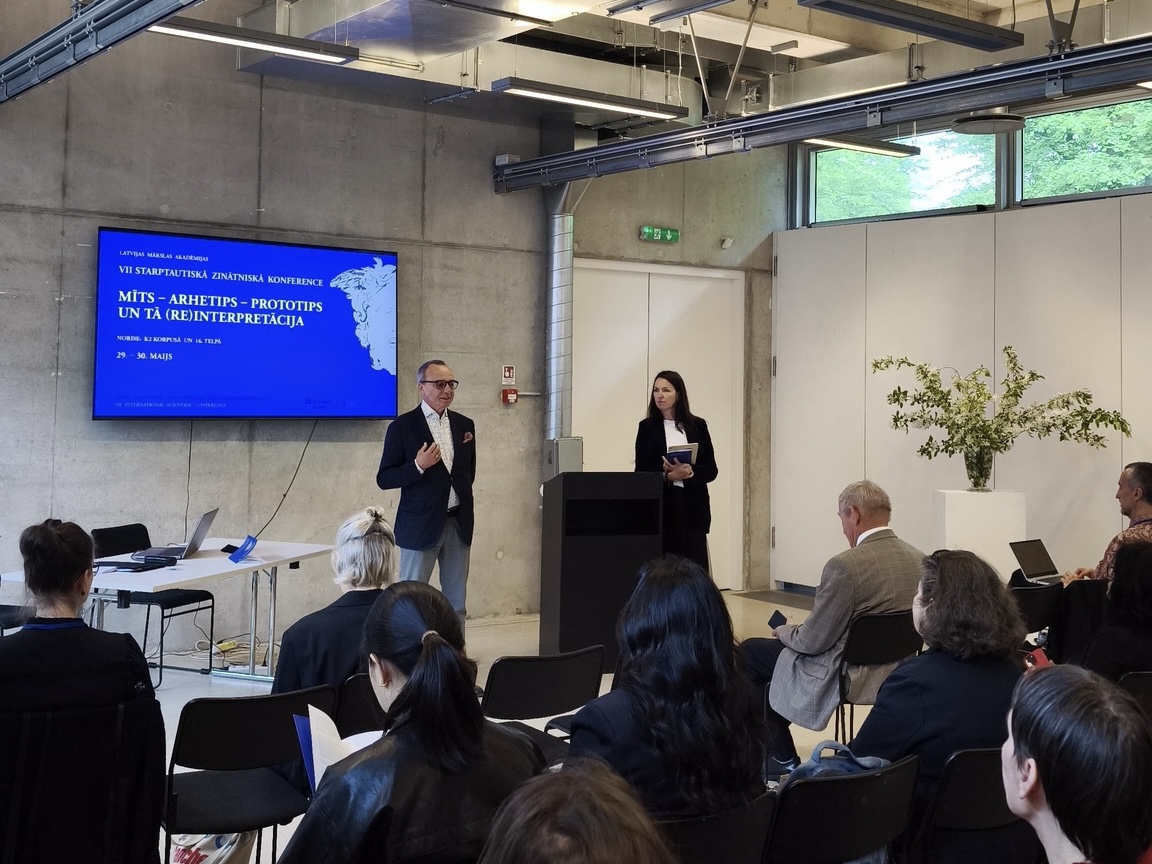
From 26 to 29 May, Jāzeps Vītols Latvian Academy of Music (JVLAM) hosted an international academic conference for Northern-Baltic traditional music and dance researchers: “Cultural Self-Determination: Construction and Representation of Music and Dance Practices in Public Domain Performances”.
30.05.2025.
The conference featured not only academic discussions but also field visits to the Nīca and Suiti cultural spaces.
It was designed as a platform for both participants and researchers of local music and dance practices to strengthen cultural self-determination as part of a sustainable, community-based process. The construction and representation of music and dance practices in public performances is a crucial component in these processes, as is the partnership between researchers and communities in traditional culture and its research.
Within the framework of the CERS project, presentations included “Latvian Folk Dance from the Perspective of Practitioners: Two Types of Tradition” by Rūta Muktupāvela (together with Elīna Gailīte, LAC), and Anda Beitāne, who led a round table discussion on “Public Spaces as Places of Presentation and Representation of Local Music and Dance in Latvia”.
Conference programme: here
Photo – JVLAM Facebook page
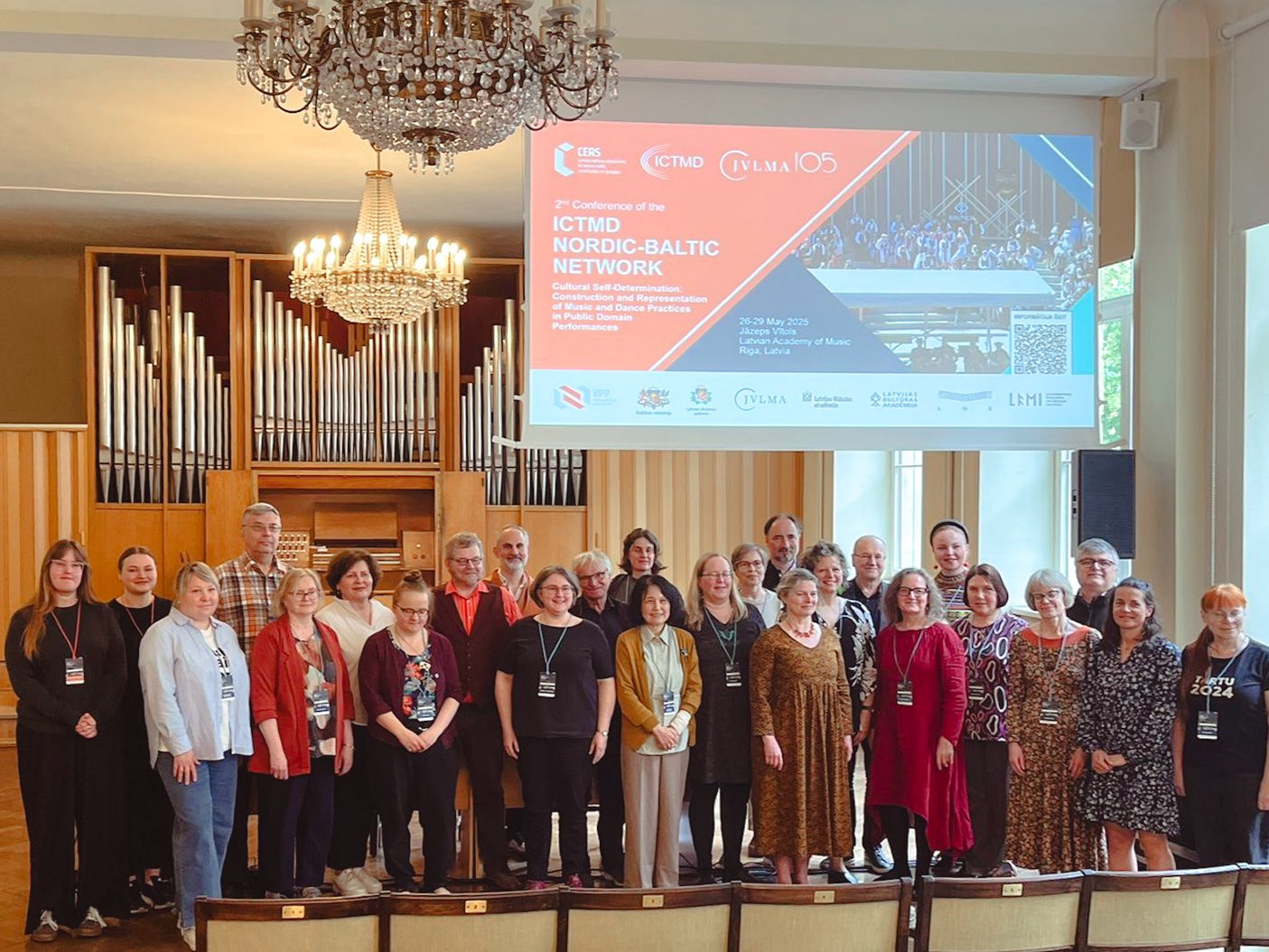
On 27–28 May, the Riga Stradiņš Museum of the History of Medicine hosted the international academic conference “Embodied Visions: Performativity, Visuality, Materiality”, focusing on space, form, material, and movement in the visual and performing arts of the 1960s–1980s.
29.05.2025.
On 27–28 May, the Riga Stradiņš Museum of the History of Medicine hosted the international academic conference “Embodied Visions: Performativity, Visuality, Materiality”, focusing on space, form, material, and movement in the visual and performing arts of the 1960s–1980s.
The interdisciplinary conference gathered both scholars of performance arts and practicing artists from the Baltic Sea region, as well as from the Netherlands, the USA, and the UK. Of special note was a one-hour lecture dedicated to the Latvian artist Modris Tenisons and his work in the Kaunas pantomime troupe, presented by Lithuanian theatre scholar and artistic director of Kaunas National Drama Theatre, Edgaras Klivis.
The late Soviet period was also examined in several other papers. For instance, art historian Sam Čermak from the University of Manchester discussed performances in Bratislava’s urban space in the 1970s, when, following the Prague Spring and subsequent normalization policies, experimental and unofficial art was deemed illegal. Art historian Laine Kristberga analysed sculptor Ojārs Feldbergs’ 1989 performance “A Common Stone”, which, in the context of Latvian art history, is one of the few politically critical performances, openly protesting against Soviet-organized mass deportations.
On the second day of the conference, 28 May, a separate session was devoted to costume and its performative agency. The keynote lecture was delivered by Danish artist and researcher Charlotte Østergaard. The theme was further developed by Associate Professor Franziska Bork Petersen from the University of Copenhagen, who analysed the multisensory impact of dance costumes, while artist Laura Feldberga explored clothing as a medium of memory, family connections, and performativity in her creative practice.
The conference was organized by the Institute of Literature, Folklore and Art of the University of Latvia (ILFA) in cooperation with the Latvian Performance Art Centre within the framework of the CERS project.
The conference was also part of the programme of the international performance art festival “Starptelpa”.
More about the festival: https://www.rigaperformancefestival.com/
Photo – Laine Kristberga’s personal archive.
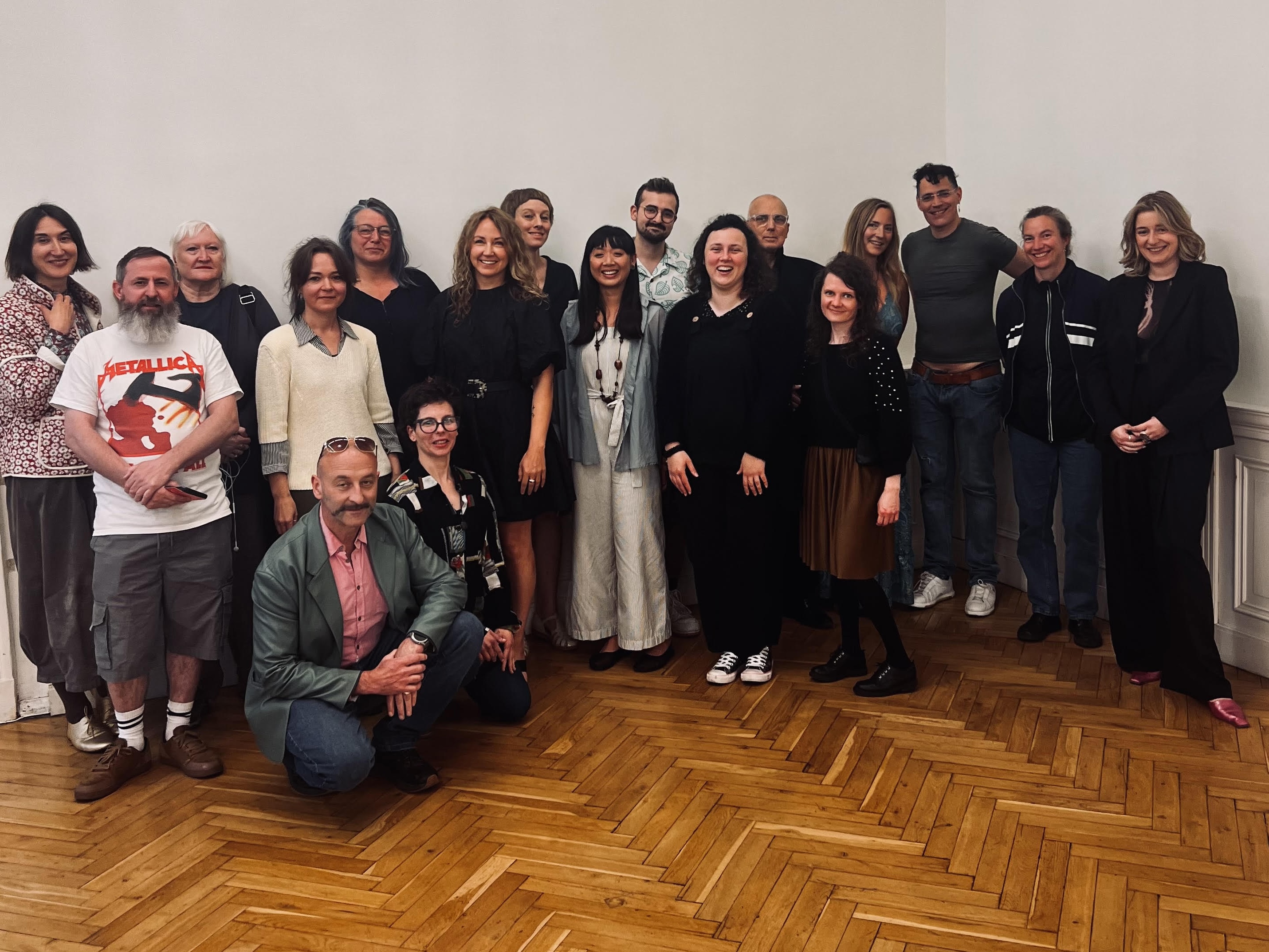
May 29 – Launch of Researcher Jānis Ozoliņš’ Monograph “Introduction to Narratology”

Upcoming Conference – “Cultural Self-Determination: Construction and Representation of Music and Dance Practices in Public Domain Performances”
May 26–29, 2025
This upcoming international scientific conference will take place at JVLMA and is part of the SRP project “Latvian Culture – A Resource for State Development” (2023–2026) / CERS.
It is also the 2nd academic meeting of the newly founded Northern-Baltic network of the ICTMD.
The Riga conference will provide a platform for local practice participants and researchers to strengthen cultural self-determination processes.
More information is available here.

Jāzeps Vītols Latvian Academy of Music (JVLAM) professor Anda Beitāne appeared on Latvia’s Radio 3 programme “Pārmijas” to introduce the JVLAM conference “Cultural Self-Determination: Construction and Representation of Music and Dance Practices in Public Performances” (26–29 May 2025).
26.05.2025.
In the programme, Anda Beitāne explained: “With this conference we want to draw attention to how local traditions are presented in public performances. Discussions will also focus on the personal experiences, thoughts, and actions of singers, dancers, and musicians in various situations related to public performances. We will also talk about the role of the researcher in these processes.”
The conversation is available here.
Researcher Jānis Ozoliņš from the Institute of Literature, Folklore and Art of the University of Latvia (ILFA) appeared on Latvia’s Radio 1 programme “Kultūras Rondo” to present the recently published first book in Latvian dedicated to the history, theory, and practice of narratology, “Introduction to Narratology”, released by ILFA.
24.05.2025.
The conversation with host Gustavs Terzens can be listened to here.
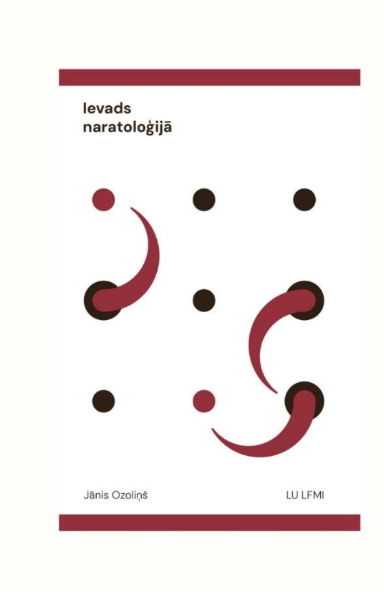
Discussion on art and artificial intelligence on Latvia’s Radio 3
12.05.2025
On Latvia’s Radio 3 programme “Meistars Knehts”, CERS representative Andris Teikmanis took part in a conversation focusing on the relationship between the artist and artificial intelligence.
The discussion addressed what can be considered human-created art, the concept of authorship, the democratization of creativity, as well as the impact of AI tools on the understanding and interpretation of reality.
The conversation can be listened to here.
Photo – Arnolds Auziņš / Latvia’s Radio
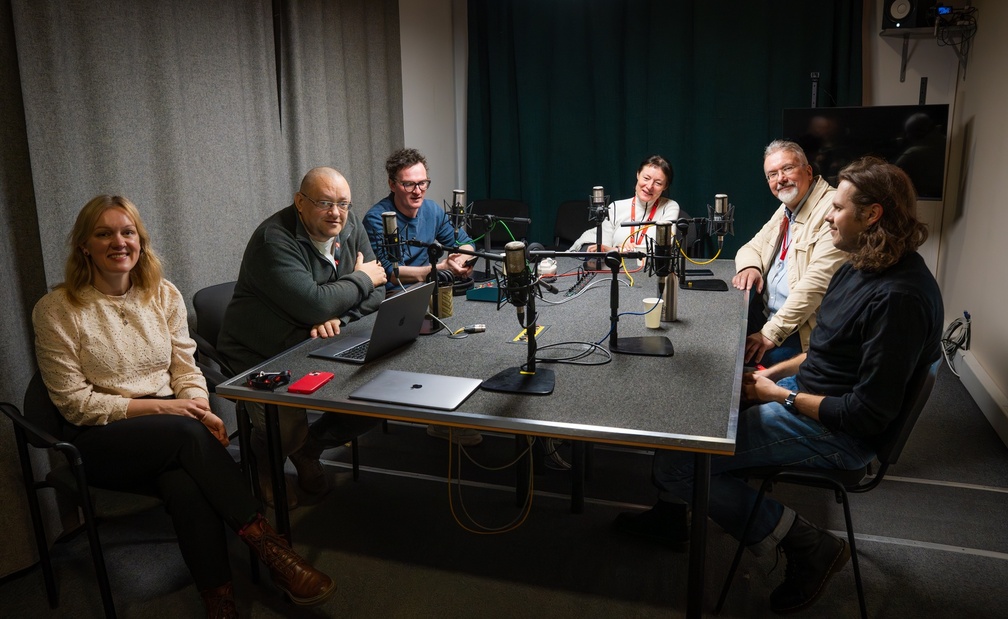
Līga Goldberga visits the Punctum podcast
08.05.2025
CERS project representative Līga Goldberga visited the Punctum podcast for a conversation with Linda Mencis about the research of photographer Zenta Dzividzinska’s archive, vitality in the work of an archivist, and the specifics of photographic research, as well as the concept of memory, its forms, and variability.
Līga Goldberga’s research on Zenta Dzividzinska is being developed within the CERS project.
The conversation can be listened to here.
Photo – “Punctum” Facebook page.
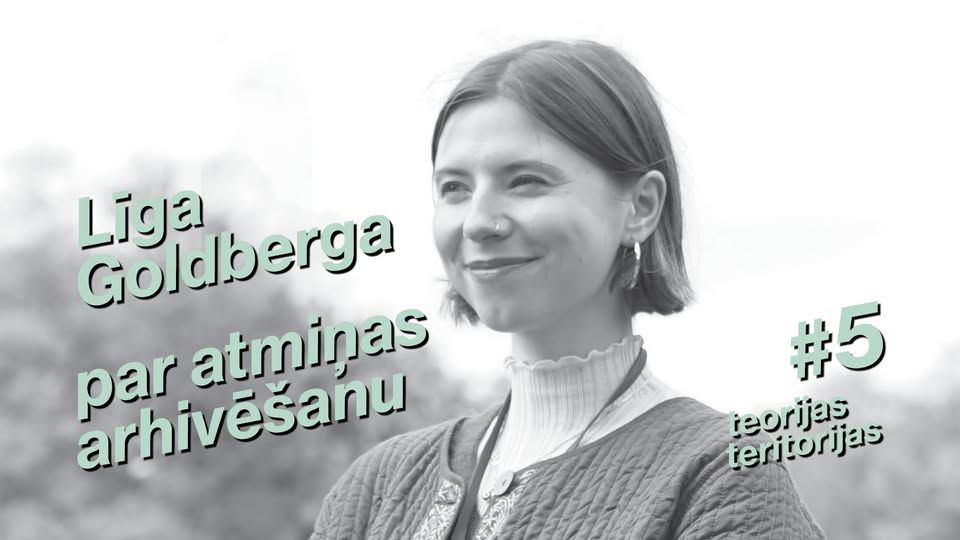
“Listen and Explore” – a music selection for students and young researchers!
06.05.2025
What inspires researchers? Silence, classical music, rock, jazz moods, or Latvian folk songs? The playlist “Listen and Explore” brings together songs recommended by researchers of the project Project “Cultural and creative ecosystem of Latvia as a resource of resilience and sustainability” / CERS, part of the State Research Programme “Latvian Culture – a Resource for National Development” (2023–2026). The songs help to prepare, dive into work, or celebrate achievements.
The playlist includes classical music, jazz, Latvian music, rock, and electronic sounds – from Mozart and Vasks to “Pērkons”, NSRD, and Metallica.
For some researchers, music is an essential part of daily work; for others – a reward after submitting an article. Some listen to Bee Gees or Nina Simone, while others happily return to Latvian folk songs in Pauls’ arrangements. The playlist is designed as a resource of inspiration – listen, act, explore!
Photo – Latvian Academy of Culture (LAC).

The radio programme “Kultūras Rondo” featured a conversation with art historians – Jānis Kalnačs, author of the monograph “From Liepāja to Lexington. Janis Šternbergs”, and editor Kristiāna Ābele.
06.05.2025.
The authors explain that the monograph offers a perspective on a forgotten artist who, until the end of his life, continued working in his profession, especially flourishing during the last fifteen years of his career. It is an attempt to connect the two stages of Jānis Šternbergs’ artistic activity, which had been interrupted by the Soviet occupation and the Second World War.
The recording of the programme can be listened to here.
Photo – from the publisher “Neputns” Facebook page.
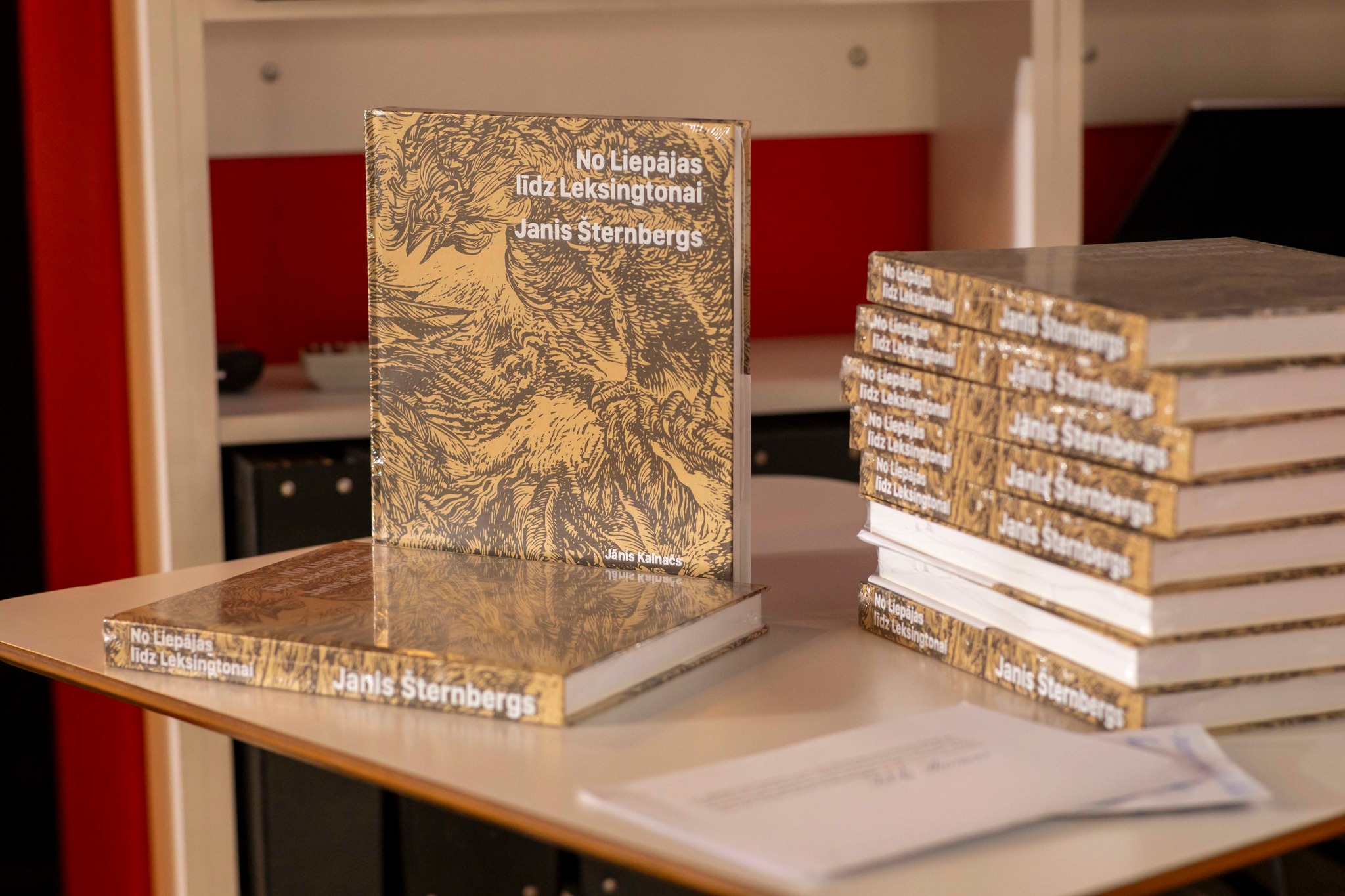
CERS Researchers Participate in Cambridge Conference
28.04.2025
From April 24–26, CERS researchers presented at the 16th Baltic Studies Conference in Europe, held at the University of Cambridge, UK.
Conference Presentations by SRP Project CERS Participants Included Topics Such As:
Agita Gritāne (LMA) “The Role of the Baltic National Religions and Their Reflection in the Art of the 20th Century during the Interwar Period”
Deniss Hanovs (LMA) “Authoritarian Coup d’Etat in Latvia 1934 in the Context of European Interwar Non-Democratic Aesthetics of the Performative Glorification”
Ieva Kalniņa (LMA) “Cracks in the Wall: The Pathways of Contemporary Ideas in Latvian Art during the Soviet Occupation (A Case Study of the Collection of Zenta Logina and Elīze Atāre)
Sanita Duka (LMA) “”Active Art” by Andrejs Kurcijs: A Seminal Theoretical Text of Transcultural and Transdisciplinary Studies in latvian Culture from 1920s”
Katrīna Teivāne (LNB): "Female Representation in the Latvian Photography in the Early 20th Century" panelī "Transgressive Aesthetics in the 20th Century Latvian Photography"
Līga Goldberga (LNB): "Undone Portraits: Nude Photography by Latvian Photographer Zenta Dzividzinska (1944-2011)" panelī "Transgressive Aesthetics in the 20th Century Latvian Photography"
Lauma Mellēna-Bartkeviča (JVLMA): Rock-opera ‘The Bearslayer’ (1988): an issue of remembrance culture throughout 30 years of independence?
Laine Kristberga (LU LFMI): “The Performative Potential of Self-Portraits: Zenta Dzividzinska and Gunārs Binde”
Jānis Oga (LU LFMI): “Latvian Poet Imants Ziedonis as the Leader of the Latvian Culture Fund (1987-1993)" (Latviešu dzejnieks Imants Ziedonis kā Latvijas Kultūras fonda vadītājs (1987-1993))
Photos – Laine Kristberga, Lauma Mellēna-Bartkeviča, Jānis Oga



Ilona Kunda Joins “Kultūras Rondo” to Discuss Contemporary Dance in Latvian Culture
28.04.2025
On Kultūras Rondo, Ilona Kunda discussed her research on contemporary dance professionals’ views on employment and social protection, conducted within the SRP project CERS.
Listen to the conversation [here].
Radio Program “Kultūras rondo” Discusses Kalnačs’ Monograph
18.04.2025
A conversation with art historian Jānis Kalnačs and editor Kristiāna Ābele aired on Kultūras rondo.
Listen to the recording [here].
SRP Project CERS International Interdisciplinary Scientific Conference Concludes
16.04.2025
On April 12, the international interdisciplinary conference “POSTCOLONIAL SITUATION IN THE ARTS AFTER THE COLLAPSE OF THE SOVIET UNION: EXPERIENCE, IMPACT, REASSESSMENT” concluded at the Jāzeps Vītols Latvian Academy of Music (JVLMA).
From April 9–12, over 60 researchers from various countries presented studies in music, visual arts, literature, film, and performance arts focused on the late Soviet era and its impact on contemporary society.
The conference was organized by Jānis Kudiņš and Lauma Mellēna-Bartkeviča.
More info [here].
Conference Presentations by SRP Project CERS Participants Included Topics Such As:
Jānis Kudiņš (JVLMA): “The Postcolonial Situation and the Reassessment of Past Discourses in Latvian Classical Music History”
Inga Pērkone (LKA): “Possibilities of Decolonization: Historiography of the Latvian Cinema”
Liene Jākobsone, Dina Suhanova, Eva Sommeregger (LMA): “Architecture of Power. The Case of Socialist Realism and Post-War Modernism”
Kristiāna Vaickovska (JVLMA): “Reassessing the Legacy of Lūcija Garūta: A Postcolonial Perspective on Soviet-Era Latvian Choral Music”
Māra Traumane (LMA): ““Close other” and its Omissions. Place of the Baltic Art Histories in Regional Discussions in Eastern Europe since 2000”
Deniss Hanovs (LMA): “Doomed to Repeat? Discourses of Decolonisation in Contemporary Latvian Memory Politics”
Lauma Mellēna-Bartkeviča (JVLMA): “Turbulent Waters of Freedom: Opera in Transition. Latvian case”
Zane Balčus (Viļņas universitāte, Lietuva / LKA): “Shifting Perspectives of Subjectivity in Documentary Filmmaking in the Baltic Countries”
Laine Kristberga (LU LFMI): “Beyond the Gaze: Radical Aesthetics in Zenta Dzividzinska (1944–2011) and Anna Maskava’s (1990) Photography”
Jānis Taurens (LMA): ““Sun Shines Where It Is Allowed; Sun Shines As It Is Allowed”: Art and Theoretical Reflection”
Kristiāna Ābele (LMA): “Outdated Documents of the Age? Unaccomplished Soviet-Era Dissertations in Latvian Art History and their Role in the Continuity of the Discipline”
Edgars Raginskis (JVLMA): “Cultural Politics and Musical Censorship: Examining the Case of ‘Sinfonietta Rīga’ Chamber Orchestra and the Decolonisation of Latvian Identity in the Arts”
Indriķis Veitners (JVLMA): “The Tradition of Latvian Big Bands and its Importance in the Development of Latvian Jazz After 1991”
Antra Priede (LMA): “Formation of Curatorial Discourse in the 20th century 90s in Latvia. The Paradigm of Exhibition Histories”
Andrievs Alksnis (JVLMA): “Revitalization of Progressive Rock: Uģis Prauliņš and “Vecās Mājas” – Cultural Transition from the Late Soviet Era (1987–1994) and the Reunification (2023–present)”
Mārtiņš Mintaurs, Zane Grosa (LNB): ”Popular Music and Politics in the Late Soviet Latvia (1970–1990)”
Photo – JVLMA Website

Book Launch: Jānis Kalnačs’ Monograph "From Liepāja to Lexington. Janis Šternbergs"
12.04.2025
On April 11, at the museum and research center Latvieši pasaulē, the launch of the monograph "From Liepāja to Lexington. Janis Šternbergs" by Jānis Kalnačs took place. The book was created as part of the SRP project CERS.
Photo recap available on Neputns publishing's Facebook page.

SRP Project CERS Representatives Discuss Current Art Research Topics on Radio Shows, Presenting the Conference “Postcolonial Situation in the Arts After the Collapse of the Soviet Union: Experience, Impact, Reassessment”
09.04.2025
On April 4, conference representatives appeared on the radio program Kultūras rondo to present the conference theme. Participants included art scholar and curator Ieva Astahovska, professor Jānis Kudiņš, and senior researcher Benedikts Kalnačs.
Listen to the April 4 Kultūras rondo episode [here].
On April 8, the radio program Pārmijas hosted theatre scholar and critic Lauma Mellēna-Bartkeviča, who discussed the scope, participants, and ideas of the upcoming conference.
Listen to the April 8 Pārmijas episode [here].
Director of the Institute of Art History at the Art Academy of Latvia, Kristiāna Ābele, Awarded the Grand Medal of the Latvian Academy of Sciences
03.04.2025
At the Spring General Assembly of the Latvian Academy of Sciences (LAS) on April 3, 2025, Kristiāna Ābele received the Grand Medal for her research in Latvian and Baltic art history. Congratulations!
Kristiāna Ābele gave a lecture titled “Art Historian and the Era: Tatjana Kačalova’s Thread in the Labyrinth of the 20th Century,” a topic explored within the SRP project CERS.
Recording available here (01:09:30–01:45:00). Presentation available here.
Photo – Kristiāna Ābele’s Facebook profile.
_DJbUwKb.jpg)
Latvian Academy of Culture Vice-Rector for Research Anda Laķe (Head of SRP project CERS WP 1) Receives State Award – The Cross of Recognition
02.04.2025
On March 24, 2025, President of Latvia Edgars Rinkēvičs and the Chapter of Orders, pursuant to Article 30 of the Law on State Awards, awarded the Cross of Recognition and appointed Professor Dr.sc.soc. Anda Laķe, Vice-Rector for Research at the Latvian Academy of Culture and Head of the Institute of Culture and Arts, as an Officer of the Cross of Recognition for her exceptional merits to the Latvian state. We are proud and offer heartfelt congratulations!

Two LKA Student Research Pilot Projects Launched
In November 2024, students at the Latvian Academy of Culture (LKA) will begin implementing two research pilot projects. Over four months, each team, under the guidance of a mentor, will test an approach to measuring the social impact of the cultural and creative industries. Paula Cukura, a second-year master's student in Creative Industries and Growth Management, plans to develop a methodology to assess the impact of the creative community center Viskaļi – Institute of Life Quality Design. Meanwhile, a team of second-year students from the bachelor's program Cultural Sociology and Management, led by Anete Liepiņa, will focus on how graffiti reflects students' emotional state, self-confidence, life satisfaction, and sense of community. Their research will be conducted in the Valmiera region. The competition is part of the study Latvia’s Cultural Ecosystem as a Resource for National Resilience and Sustainability / CERS, specifically within the work phase Developing Approaches to Assessing the Social and Economic Impact of the Cultural and Creative Industries. The goal is to create new theoretical and empirical approaches for evaluating the social and economic impact of cultural and creative industries.
Defense of the Theoretical Research for the Professional Doctorate in Arts at JVLMA
20.12.2024.
On December 19, 2024, at Jāzeps Vītols Latvian Academy of Music (JVLMA), Liene Denisjuka-Straupe defends her theoretical research Juris Ābols' Dadaist Chamber Works with Flute: The Revelation of Artistic Ideas through Composition Analysis and Interpretation Experience. This research, developed within the national research program project Latvia’s Cultural Ecosystem as a Resource for National Resilience and Sustainability / CERS, is presented in fulfillment of the requirements for the Art.D. (Artium Doctor) professional doctorate in arts. Liene Denisjuka-Straupe was a project participant during its initial 12-month phase. The scientific advisor for the theoretical research is Professor Jānis Kudiņš, the lead project participant of the CERS project at JVLMA.
Several research articles developed within the VPP project CERS have been published in the journal Art History and Theory by the Institute of Art History of the Latvian Academy of Arts
12.12.2024.
The 28th issue of the journal Art History and Theory, published by the Institute of Art History of the Latvian Academy of Arts, has been released. This edition includes three research articles developed within the project CERS, all of which are available for open access online.
Una Valtere – Embroidered Men’s Belts (Beaded Belts) in Latvia and Their Social Context.
Read the article here
Sniedze Kāle – Issues in Gustavs Klucis’ Agitational Stand Research.
Read the article here
Eduards Kļaviņš – Art and Society: Reception of Visual Art during the Soviet Years in Latvia.
Read the article here
VPP CERS project researcher and representative of the Institute of Literature, Folklore, and Art of the University of Latvia, Kitija Balcare, is the guest editor of the latest issue of the journal Theatre Herald (Teātra Vēstnesis) on the theme Ecotheatre
12.12.2024.
The journal's website states that the guest editor, Kitija Balcare, introduces the concept of ecotheatre, highlighting the question of how the climate crisis affects theatre. In a roundtable discussion on the role of scenographers in the life cycle of performances and ecoscenography, she brings together Pamela Butāne, Aigars Ozoliņš, Monika Pormale, Reinis Suhanovs, and Maija Pavlova, the producer of Ģertrūdes Street Theatre. Kitija Balcare also interviews ecoscenography theorist and practitioner Tanja Beer and shares diary notes from the European Theatre and Performance Research Association conference in Spain. Tijana Mičanović provides insights into ecotheatre in Serbia. Krista Burāne speaks with Barbara Lehtna, as both of their productions focus on the interaction between humans and nature, as well as climate and ecological issues. Kristīne Brīniņa and Jānis Balodis write essays on human impact on nature and non-human beings.
The latest issue of Theatre Herald (Teātra Vēstnesis) on the theme Ecotheatre is available here
Researchers from the Art Academy of Latvia participate in an international academic conference in the USA
25.11.2024
From November 21 to 24, 2024, lecturers from the Art Academy of Latvia, Dr. Jānis Ozoliņš and Dr. Kārlis Vērdiņš, took part in the annual ASEEES (Association for Slavic, East European, and Eurasian Studies) conference in Boston, USA. They presented a paper titled Performing Working-Class Masculinity in Soviet Western Borderlands: The Case of Latvian "Severe Style" Paintings, focusing on the figurative works of painter Edgars Iltners. In addition to presenting their research at the largest conference dedicated to regional studies, which this year gathered a record number of scholars—nearly 3,000 participants from around the world—both AAL lecturers also engaged in working groups and affiliated researcher associations. As a jury representative for The Heldt Prize, named after Barbara Heldt, Jānis Ozoliņš presented the award for the best academic article published in 2023. It was also officially announced that the 2026 conference of The Association for Women in Slavic Studies will take place in Riga at the Art Academy of Latvia, bringing together members from the United States and Europe. The full conference program is available here: https://aseees.org/convention/2024-convention/program/
In the photo, from the left: Jānis Ozoliņš and Kārlis Vērdiņš with Latvian-American art historian Mark Allen Švēde, a professor at Ohio State University, who also participated in the panel organized by the AAL lecturers.
A collection of academic articles on the assessment of social and economic impact in the creative and cultural industries to be published within the VPP project CERS
25.11.2024
Researchers are invited to submit publications for the thematic issue of the journal Culture Crossroads, focusing on the challenges of assessing the social and economic impact of culture. This issue will continue the discussion on impact assessment and methodological applications in the cultural and creative industries (CCI), which was initiated during the thematic session Assessing Social and Economic Impact in the Creative and Cultural Industries as part of the Culture Crossroads XVIII conference series at the Latvian Academy of Culture this autumn.
The deadline for article submissions is February 10, 2025. More information: https://culturecrossroads.lv/index.php/cc/call-for-papers
The publication will be prepared within the VPP project CERS.
The thematic session of the VPP project CERS took place at the Culture Crossroads XVIII conference
13.11.2024
As part of the Culture Crossroads XVIII conference series at the Latvian Academy of Culture, the thematic session Assessing Social and Economic Impact in the Creative and Cultural Industries was held on November 8.
Researchers from Latvia, the Netherlands, Belgium, and North Macedonia participated in the session, focusing on the evaluation of social and economic impact in the creative and cultural industries. This session was organized within the framework of the VPP project CERS.
On November 7 and 8, researchers from the VPP project CERS participated in the thematic sessions of the international scientific conference Culture Crossroads XVIII, organized by the Latvian Academy of Culture
13.11.2024
At the conference, researchers from the VPP project CERS shared insights from their studies, presenting the following papers:
Inga Pērkone presented The Films of Director Ivars Seleckis: The Perceived and Unperceived Cultural Heritage.
Daina Lāce and Anda Beitāne presented The Contemporary Representation of the Nīca Cultural Space: Latest Discoveries and Insights.
Una Valtere presented Embroidered Men’s Belts (Beaded Belts) in the Historical-Ethnographic Atlas of the Baltic Peoples: A Case Study of Traditional Clothing Accessories in Latvia, Lithuania, and Estonia.
Kristiāna Ābele presented On the Road with Purvītis: The Period of Tatjana Kačalova.
Ilona Kunda and Agnese Karlsone presented Employment and Social Protection of Contemporary Dance Professionals in Latvia.
Liene Jākobsone presented The Impact of User Experience Design and its Evaluation.
Ieva Kalniņa presented The Secret Source: “Samizdat” Publications in the Collections of Artists Zenta Logina and Elīze Atāre.
More information and photos are available here
VPP project CERS researcher Līga Vinogradova participates in an international scientific conference in Croatia, presenting the results of a cinema audience study
08.11.2024
From November 5 to 7, Līga Vinogradova, a researcher at the LCA Institute of Culture and Arts, participated in the 15th Annual International Small Cinemas Conference: Changing Policies, Transforming Audiences and Work Practices In-flux, held in Zagreb, Croatia. The conference, now in its 15th edition, brought together film researchers from various fields, offering diverse perspectives on film studies. This year’s focus was on discussing current issues in film production, distribution, and consumption in small countries. The event was organized by the Institute for Development and International Relations, Department for Culture and Communication, in collaboration with the Zagreb Film Festival and the Academy of Dramatic Art.
Līga presented Cinema Audience Research in Latvia: More Netflix, Less Cinema?, introducing international researchers and industry professionals to the findings of a study on Latvian cinema audiences. At the end of the panel, foreign researchers raised many interesting questions and ideas on how to interpret the data.
The cinema audience study was conducted as part of the VPP project CERS. More information is available here.
On October 31, Līga Vinogradova, a researcher at the LCA Institute of Culture and Arts, participated in the international cinema training Baltic Cinema Data Training Boot Camp, held at Kino Bize
31.10.2024
The training aimed to provide cinemas with practical tools for data analysis and audience research to support their daily operations and audience engagement strategies. Līga presented a study on Latvian cinema audiences conducted earlier this year and took part in a discussion on the specifics of planning and conducting audience research in cinemas.
More information is available here.
On October 30, Anda Laķe, head of the LCA Institute of Culture and Arts, participated in a seminar for methodological centers organized by the Latvian National Centre for Culture (LNKC)
30.10.2024.
She delivered a presentation titled Latvian Cultural Centers as Gatekeepers of Cultural Offerings, developed within the framework of the VPP project CERS. The seminar aimed to support the establishment and evaluation process of methodological centers in the context of implementing the Cultural Centers Law.
The LCA Institute of Culture and Arts has launched a study on cultural consumption habits in Latvia and is looking for participants to keep cultural consumption diaries!
28.10.2024.
The aim of the study is to explore the practices of in-person and digital cultural consumption among Latvian residents and their interaction. To achieve this, researchers will conduct an in-depth analysis of individual cultural consumption habits and strategies using cultural activity diaries. The study is part of the VPP project CERS.
At the end of October, participant recruitment began for writing cultural activity diaries. Participants will be asked to record their daily in-person and digital cultural consumption for one month in a diary format prepared by the researchers. The study seeks participants from diverse sociodemographic groups in Latvia—of any age (18+), gender, and place of residence—who are not directly involved in the cultural sector (i.e., not studying or working in related fields).
More information is available here.
VPP project CERS researcher Jānis Oga participates in an international scientific conference in Vilnius
18.10.2024.
On October 17 and 18, the Lithuanian Institute of Literature and Folklore hosted the conference Literature in Eras of Conflict: Ideology and Ethics.
At this conference, VPP project CERS researcher and scientific secretary of the University of Latvia’s Institute of Literature, Folklore, and Art, Jānis Oga, presented a paper titled Meetings of Like-minded People in Latvian Short Stories from the 1960s–1970s.
More information about the conference is available here.
Opportunity for Bachelor's and Master's students at the Latvian Academy of Culture to participate in a research pilot project competition
Students enrolled in Bachelor's and Master's programs at the Latvian Academy of Culture were given the opportunity to test approaches for measuring the social impact of the cultural and creative industries. The focus areas included quality of life and well-being, health, education and social inclusion, environment and climate, as well as innovation development.
Selected pilot project implementers were awarded a €500 scholarship to conduct empirical research. Applications for the competition had to be submitted by October 28.
More information is available here.
A discussion among researchers from Jāzeps Vītols Latvian Academy of Music on the latest developments in the VPP CERS project is published in the journal Music’s Sun (Mūzikas Saule)
09.10.2024.
In mid-summer, a group of JVLMA researchers gathered for a working seminar and discussion titled Current Issues and Challenges of the CERS Project, where they explored work processes, methods, commonalities and differences, as well as the challenges they face. Participants included Jānis Kudiņš, Kristiāna Vaickovska, Edgars Raginskis, Indriķis Veitners, Anda Beitāne, and Lauma Mellena.
The extensive discussion was adapted into a written piece titled Creating Waves and Diving Deep, which was published in the October issue of Mūzikas Saule, issue 3, pages 31-37.
More information is available here.
VPP Project Researcher Silvija Grosa Participates in an International Scientific Conference in Vilnius
08.10.2024.
On October 4–5, 2024, the international scientific conference BALTIC ART HISTORIES: Roles, References, Relations took place at the Vilnius Academy of Arts.
At the conference, VPP project researcher and professor at the Art History Institute of the Latvian Academy of Art, Silvija Grosa, presented a paper titled Research on Riga’s Art Nouveau Architecture in the 21st Century: Prospects and Interpretations.
VPP Project CERS Researchers Share Insights with Ethnographic Ensembles and Folklore Groups in Southern Kurzeme
On October 5, at the Nīca Culture House, ethnographic ensembles and folklore groups from the Southern Kurzeme region gathered for a large-scale event, The Celebration of Southern Kurzeme’s Polyphony.
The event was opened with lectures by researchers from the Art History Institute of the Latvian Academy of Art. Dr. Art. Daina Lāce presented The Rich Diversity of Nīca Shirts: Latest Discoveries and Insights, while Latvian Academy of Art doctoral candidate Una Valtere gave a talk on The Variety and Wearing Traditions of Embroidered Sashes (Zīļu Jostas) in the 19th–Early 20th Century.
VPP Project CERS Networking Event
02.10.2024.
On October 2, participants of the VPP project CERS gathered for a networking event at the Botanical Garden of the University of Latvia. The event provided an opportunity to collectively evaluate the achievements of the first year and discuss future plans.
More information is available here.
Fifth Seminar in the Domapmaiņa (Exchange of Thoughts) Series
On September 25, the fifth seminar in the Domapmaiņa series, titled Introduction to Narratology: Pedagogical Notes, took place at the Archives of Latvian Folklore, Institute of Literature, Folklore, and Art of the University of Latvia.
The seminar was led by researcher Jānis Ozoliņš, a lecturer at the Art Academy of Latvia. Discussions focused on key aspects of narratology, including how to concisely grasp its legacy and whether locally adapted terms are used in Latvian research. Attendees also had the opportunity to learn about the structure of Jānis Ozoliņš’s upcoming monograph, which explores narratology studies.
More information is available here.
Call for Papers: International Interdisciplinary Conference The Postcolonial Condition in Art after the Collapse of the Soviet Union: Experience, Impact, Reassessment
16.09.2024.
Scholars are invited to submit proposals for the international interdisciplinary conference The Postcolonial Condition in Art after the Collapse of the Soviet Union: Experience, Impact, Reassessment, which will take place from April 10–12, 2025, in Riga at Jāzeps Vītols Latvian Academy of Music.
The submission deadline is October 15, 2024.
Suggested topics include postcolonial discourses in Eastern and Central European culture after the Soviet Union’s collapse, analysis of decolonization processes in Eastern and Central European art since the 1990s, traces of Soviet-era art in cultural memory, transformations in art after regaining independence, and more.
More information and application details are available here.
An event organized by the Art History Institute of the Latvian Academy of Arts 65 Years of Art Historians' Education at the LMA took place on September 12
On September 12, the Art History Institute of the Latvian Academy of Arts (LMA) hosted the event 65 Years of Art Historians' Education at the LMA.
This fall marks 65 years since the first cohort of future art historians began their studies at LMA's Department of Art History and Theory. As 65 years often signal professional maturity in art historical research, this gathering explored key questions: What do we now know, think, and remember about the development of art history studies at LMA under Soviet rule? How do contemporary issues resonate with the challenges that faculty sought to address in the 1960s?
As part of the VPP Project CERS, several LMA researchers are currently examining archival records related to these topics. The event provided insights into these findings, engaged eyewitnesses of past events, and encouraged colleagues to contribute their own memories.
A photo retrospective of the event is available here.
Latvian National Library Exhibition Nominated for the award Kilograms kultūras 2024 (Kilogram of Culture 2024) Autumn Vote in the category Heritage
10.09.2024.
The Latvian National Library's exhibition Ieskaņots. Atskaņots. No fonogrāfa līdz mūzikas centram (Recorded. Played. From phonograph to music center) has been nominated for the public media award Kilograms kultūras 2024 in the Heritage category!
This exhibition explores the cultural history of sound recording and playback technologies and their evolution throughout the 20th century. It highlights how recorded sound transitioned from an elite privilege to an everyday necessity, shaping personal identity, cultural belonging, and even serving as an instrument of resistance in times of political change.
More information is available here (Latvian National Library Facebook post) and here (Latvian Public Media article).
VPP Project CERS Researchers from Latvian Academy of Culture’s Institute of Culture and Arts Participate in the European Sociological Association Conference in Porto
30.08.2024.
From August 27th to 30th, VPP Project CERS researchers and representatives from the Institute of Culture and Arts of the Latvian Academy of Culture (LKA KMI) – Anda Laķe, Rūta Muktupāvela, and Agnese Hermane – participated in the European Sociological Association (ESA) Conference titled Tension, Trust and Transformation in Porto, Portugal.
At the conference, two papers from the VPP CERS project were presented:
- Audience Development as a Resilience Strategy for Arts Organizations: Talks Before and After an Arts Event (authors: Rūta Muktupāvela, Anda Laķe).
- Inclusive Regulation of Cultural Supply: Strategies for the Implementation of the Cultural Consumption Basket (authors: Agnese Hermane, Anda Laķe).
For more details, click here.
The First International Professional Doctoral Summer School held in Stāmeriena
26.08.2024
From August 19 to 22, the first International Professional Doctoral Summer School, jointly organized by the Latvian Academy of Culture (LKA) and the Lithuanian Academy of Music and Theatre (LMTA), took place in Stāmeriena. During lectures, masterclasses, think tanks, and individual consultations, doctoral students from Latvia and Lithuania met with international lecturers. In the evenings, Stāmeriena Palace hosted a free public program, open to all interested attendees, featuring a concert, discussion, and film screening.
The goal of the Summer School was to support the professional development of Latvian and Lithuanian doctoral students, provide assistance in the advancement of their dissertation projects, and promote international interdisciplinary collaboration, creativity, and the exchange of ideas.
Some photos and a recap from Stāmeriena Palace on the recently concluded Summer School can be found here.
Kitija Balcere Participates in the 4th World Congress of Environmental History
26.08.2024
From August 19 to 23, the 4th World Congress of Environmental History 2024, titled Transitions, Transformations, and Transdisciplinarity: History Beyond History, took place in Oulu, Finland. Among the participants was Kitija Balcere, a research assistant at the Institute of Literature, Folklore, and Art of the University of Latvia (LU LFMI), who presented a paper titled Spatiotemporality in Ecotheatre. Deepening Ecological Awareness Through Art.
More information about the congress is available here.
Summer School Gender Studies in Cultural and Art History Research and Memory Institution Work organized by the Latvian National Library and the Latvian Academy of Arts
26.08.2024
From August 19 to 23, the summer school Gender Studies in Cultural and Art History Research and Memory Institution Work took place, organized by the National Library of Latvia and the Art Academy of Latvia. On August 19 and 20, the public program of the summer school was open to all interested attendees at the National Library of Latvia’s conference center.
The summer school introduced students and participants to the theoretical foundations of feminism and gender studies, explored the integration of these research strategies in museum and exhibition curation, and examined their representation in the physical and digitized collections of memory institutions. The program included lectures by researchers and curators, visits to the National Library of Latvia, museum collections, and artist studios, as well as hands-on workshops. The summer school focused on feminist and gender studies perspectives in visual and applied arts, photography, literature, and cinema.
More information about the summer school is available here.
A segment on the summer school, produced by radio program Kultūras Rondo, can be listened to here.
An overview of the summer school by the National Library of Latvia's Art and Music Center is available here.
JVLMA Researchers Discuss Updates on the VPP Project CERS
30.07.2024
In mid-summer, a group of researchers from the Jāzeps Vītols Latvian Academy of Music (JVLMA) gathered for a working seminar and discussion titled CERS Project Updates and Challenges. The discussion focused on work processes, methodologies, shared and differing approaches, as well as the challenges encountered in the project.
The content of the discussion will be published in the autumn issue of the professional music journal Mūzikas Saule. (Music’s Sun)
Participants in the discussion included Anda Beitāne, Jānis Kudiņš, Lauma Mellēna-Bartkeviča, Edgars Raginskis, Kristiāna Vaickovska, and Indriķis Veitners.
More information is available here.
Initiative radi! Academy Sessions Held in Liepāja and Sigulda Regions
21.07.2024
The radi! Academy continues its journey across Latvia, aiming to enhance local community social impact and foster the development of creative industries. Three meetings with local communities have taken place: the first on July 3rd in Liepāja region, the second on July 9th in Sigulda region, and the third on July 20th in Valmiera region.
During these sessions, participants explored, analyzed, and proposed methods and frameworks for measuring social impact within the region and specific initiatives. The meetings were organized within the framework of the VPP Project CERS.
More information about the Liepāja region session is available here.
More information about the Sigulda region session is available here.
More information about the Valmiera region session is available here.
Call for Papers for the Special Issue of Culture Crossroads
18.07.2024
The special issue of the journal Culture Crossroads, titled Exploring the Past and Future of Audiovisual Media in the Baltic Sea Region: Archives, Digital Platforms, Researchers, and Spectators, will focus on the history of audiovisual collections in the Baltic Sea region and the impact of digital technologies on their accessibility.
The issue will compile papers presented at the IX Baltic Sea Region Film History Conference (held in June 2024 in Riga) as well as other articles related to the journal’s theme.
Submission deadline: September 23, 2024.
More information is available here.
Lauma Mellēna-Bartkeviča Participates in an International Scientific Conference in Estonia
09.07.2024.
VPP project CERS researcher Lauma Mellēna-Bartkeviča, representing the Jāzeps Vītols Latvian Academy of Music, participated in the international scientific conference Cultural Heterologies and Democracy II: Transitions and Transformations in Post-Socialist Cultures in the 1980s and 1990s, which took place from June 26 to 28 in Tallinn.
She presented a paper titled Rock-opera 'The Bearslayer' (1988): Socio-Cultural Perspective and Research Challenges.
More information is available here.
Call for Papers: International Scientific Conference on the Representation of Traditional Music and Dance Practices
04.07.2024.
An international scientific conference Cultural Self-Determination: Construction and Representation of Music and Dance Practices in Public Domain Performances, will take place at Jāzeps Vītols Latvian Academy of Music from May 26 to May 30, 2025.
Call for Papers: Submissions are open until November 1, 2024.
More information is available here.
Image – Jāzeps Vītols Latvian Academy of Music website
An article by Kitija Balcare, a researcher from the CERS project, has been published in the journal Critical Stages/Scènes critiques
03.07.2024.
In the June published article Choreography of Life: Kristīne Brīniņa and Her Documentary Dance Method, Kitija Balcare describes the documentary dance method of the Latvian choreographer Kristīne Brīniņa.
The article can be read here.
The articles by the representatives of the CERS project have been published in the journal Acta Acadamiae Artium Vilnensis
03.07.2024.
In the 112th issue of the journal Acta Acadamiae Artium Vilnensis, titled Art in a Modern City for a Modern State: Celebrating 100 Years of the Kaunas School of Art, two articles have been prepared by the CERS project researchers, representatives of the Latvian Academy of Arts:
Stella Pelše's article: Do We Need an Art Academy? Clashes of Opinions in Latvia During the 1920s (pp. 294–313)
Inese Sirica's article: Art Academy of Latvia Graphic Arts Alumnae Who Established the Principles of Latvian National Textile Art, 1931–1943 (pp. 314–349)
More information is available here.
Zita Kārkla and Laine Kristberga participated in the conference Cultural Heterologies and Democracy II: Transitions and Transformations in Post-Socialist Cultures in the 1980s and 1990s in Estonia
28.06.2024.
From June 26 to 28, Tallinn (Estonia) hosted the conference Cultural Heterologies and Democracy II: Transitions and Transformations in Post-Socialist Cultures in the 1980s and 1990s, organized by the Estonian Academy of Arts, Tallinn University, and the University of Tartu. The conference featured Zita Kārkla from the LU LFMI, who presented the paper Recovering Feminist Sensibilities: Latvian Women's Writing of the 1980s, and Laine Kristberga, also from LU LFMI, with the paper Performance Art as a Form of Dialogue.
Anda Laķe and Agnese Hermane participated in an international scientific conference in Portugal
26.06.2024.
Researchers Anda Laķe and Agnese Hermane, representing the Latvia Academy of Culture, attended the international AIMAC Lisbon 2024 conference on arts and cultural management at the end of June.
During the conference, the researchers presented a paper titled Cultural policy for a diverse and inclusive cultural offer: strategies of the introduction of the cultural consumption basket, developed as part of the CERS project.
More information is available here.
Laine Kristberga participated in the AABS conference in the USA
17.06.2024.
Laine Kristberga participated in the AABS conference The Baltic Way: Unity and Giving Aid at Yale University, USA, from June 13 to 16. She organized a panel discussion titled A Century of Collective Collaboration: Intersection Between Arts and Politics with Baņuta Rubess (University of Toronto) and Sanita Duku (Latvian Academy of Art).
Her presentation, titled Performative Collaboration in Latvian Art and Politics in the Period of the Third National Awakening, focused on the intersection of art and politics, and the analysis of public spaces—particularly urban environments—in the 1980s.
Agita Gritāne participated in the AABS conference in the USA
17.06.2024.
Agita Gritāne, representing the Latvian Academy of Arts, presented at the AABS conference The Baltic Way: Unity and Giving Aid at Yale University, USA, from June 13–16. Her presentation was titled Silent protest of propaganda art. Case study of Latvian artist Jēkabs Bine.
An international scientific conference titled Exploring Cognitive Processes in Architecture and Art has taken place
17.06.2024.
From June 13 to 14, the annual international scientific conference organized by the PhD program of the Latvian Academy of Art (LMA) took place under the title Exploring Cognitive Processes in Architecture and Art. This year's conference focused on the multidimensional nature of cognitive processes.
The conference was organized into four thematic sections:
- Modeling Cognitive Problems
- The Range of Human Cognition and the Potential of AI to Expand Cognitive Abilities
- Cognitive Methods in the Study of Art Processes and Artifacts
- Style and School in Artistic Creation: Case Studies from Latvian Art History
The conference recording is available here.
The conference program is available here.
An international symposium titled Lost and Found: Revisiting Stories in Art and Exploring Possible Changes has recently concluded
10.06.2024.
From June 6th to 7th, an international symposium titled Lost and Found: Revisiting Stories in Art and Exploring Possible Changes took place at the Latvian Academy of Arts. The symposium gathered over 40 participants from around the world, featuring scientific readings, workshops, art actions, discussions, and an exhibition opening.
This symposium follows two related events: one held in Lisbon on December 6-7, 2023, and another in Warsaw from March 21-23, 2024. All three events were inspired by Wisława Szymborska's poem Speech at the Festival of the Lost and Found (1972).
More information is available here.
Māra Simons has defended her doctoral thesis
10.06.2024.
On June 7th, at the open session of the Promotion Council of the Latvian Academy of Culture, Māra Simons defended her doctoral thesis titled The Construction of the Hybrid Diasporic Identity Among Latvia’s Modern Diaspora in Sweden for the acquisition of a Ph.D. in humanities and art sciences.
The thesis was developed as part of the VPP CERS project, and the thesis supervisor is the project leader and researcher, Rūta Muktupāvela.
Elīna Vikmane participated in the European Museum Organisation Association visit in Oslo
10.06.2024.
From June 4th to 6th, the European Museum Organisation Association visit took place in Oslo, where Elīna Vikmane, a researcher from the CERS project, participated.
As part of the Digital Transformation in Museums working group, Elīna Vikmane met with representatives from several Norwegian museums who shared their experiences using artificial intelligence in their work.
More information is available here.
The IX Baltic Sea Region Cinema History Conference has taken place
10.06.2024.
From June 6th to 8th, the IX Baltic Sea Region Cinema History Conference The Past and Future of Audiovisual Media in the Baltic Sea Region: Archives, Digital Platforms, Researchers, and Spectators took place at the K.Suns Cinema (Elizabetes Street 83/85, Riga).
Several researchers from the CERS project participated in the conference, including Līga Vinogradova, Zane Balcus, Dita Rietuma, Inese Boka-Grube, and Inga Pērkone.
Inese Boka-Grube received the Paper in Baltic Cinema Award for her presentation titled Modeling and Profiling of Audience of Historical Films in the Marketing Messages of Digital Distribution (reviewing cases of Latvia and beyond), which was recognized for its originality, scientific excellence, and significance to Baltic cinema research.
More information about the conference is available here.
An online seminar will be held on the possibilities of measuring well-being in culture
23.05.2024
How to include the cultural dimension in well-being measurement? How to evaluate the results of the project Sent to the Museum in Cēsis? What are the challenges in identifying goodness? These are the questions that the researchers of the Latvian Academy of Culture are looking for answers to within the framework of the national research programme project Latvian Cultural Ecosystem as a Resource for State Resilience and Sustainability / CERS, continuing a series of educational, research and creative activities.
On 27 May, 17:30-19:30, we invite all interested to participate in the online workshop How to measure impact? Measuring well-being in culture.
More information is available here.
The first open workshop of the Digitalization Committee of the Latvian Museums Association, within the framework of the VPP CERS project, has been held
On April 22, 2024, the first open workshop of the Digitalization Committee of the Latvian Museums Association took place, with VPP CERS researcher Elīna Vikmane also participating.
The workshop addressed the challenges of recognizing and accounting for digital visits to museums. Elīna Vikmane outlined the digital services landscape of accredited Latvian museums and highlighted the approximately 20-year digital gap in the sector. This gap explains why some museums have incorporated digital products into their daily operations, while for others, it remains a future prospect.
More information is available here.
Workshop on methods for assessing the economic impact of culture
On 29 April, as part of the VPP CERS project, the workshop How to Measure Impact? Economic Impact in Culture and Assessing the Value of Design took place.
Researcher María Nela Seijas Jiménez from the Association of Cultural Economics International provided an overview of methods for assessing the economic impact of culture, their applications, and challenges. Meanwhile, Pinara Kaigan, a leading researcher from the Latvian Academy of Art, initiated a discussion on research into the impact of design.
The aim of the online workshop was to foster discussion and critically evaluate existing research approaches used in assessing the impact of the cultural and creative sector, broadening knowledge of methodology applications in Latvian design research. The seminar was conducted in English.
A recording of the seminar is available upon request via email: lote.katrina.cerpa@lka.edu.lv.
Seminar Exchange of Thoughts. Nr. 4. Exhibition as a Multi-Layered Experience: Examples from the National Library of Latvia
On May 9, 2024, the seminar Exchange of Thoughts. Nr. 4. Exhibition as a Multi-Layered Experience: Examples from the National Library of Latvia took place at the National Library of Latvia (LNB).
The seminar was led by Anda Boluza, LNB exhibition project manager and curator; Maija Treile, head of the LNB Research and Interpretation Center and curator; and Ineta Vaivode, LNB project manager and curator.
The seminar focused on the exhibition creation process, and participants had the opportunity to visit the LNB exhibitions Elephants plagued by inaction and We are not interested in text together with their curators. It provided insights into the roles of the curator, researcher, designer, and artist in exhibition-making and offered a deeper look into LNB’s experience in exhibition curation.
The seminar is part of the VPP project CERS seminar series Exchange of Thoughts, organized by the National Library of Latvia, the Art Academy of Latvia, the Latvian Academy of Culture, and the Jāzeps Vītols Latvian Academy of Music.
More information is available here.
The National Library of Latvia has opened the exhibition Recorded. Played. From the Phonograph to the Music Center
On May 23, 2024, at 18:00, the National Library of Latvia (LNB) will open the exhibition Recorded. Played. From the Phonograph to the Music Center, featuring a performance by composer Platons Buravickis, who also created the exhibition’s soundscapes, titled The Text of Mechanics, Emotions, and Magnetism.
The exhibition explores the cultural and historical heritage of sound recording and playback technologies, tracing their evolution throughout the 20th century. It highlights key sound carriers and playback devices, illustrating how recorded music transitioned from an elite privilege to an everyday experience, becoming a means of self-expression, cultural identity, and political resistance during times of change.
The exhibition is organized within the framework of the VPP project CERS and will be open to the public free of charge in Exhibition Hall 2 on the 1st floor of LNB until November 16, 2024.
At the thematic conference Find Yourself in Cinema, the first results of the study on Latvian cinema audiences were presented
On May 17, at the National Film School of the Latvian Academy of Culture (LKA), the thematic conference Find Yourself in Cinema featured a presentation of a study on cinema audience attendance and film consumption habits. The conference also included a discussion, Audience Research: Challenges and Student Experience, where LKA students and graduates shared their experiences with audience research methods.
LKA Culture and Arts Institute researcher Līga Vinogradova introduced key insights from the study on Latvian cinema audiences, highlighting what is important to cinema visitors, what aspects are less significant, and the differences in audience habits between cinemas in Riga and regional areas. Students from LKA’s bachelor's program Cultural Sociology and Management in their first and third years focused their presentations on the cinema-going habits of young people.
The study on Latvian cinema audiences was conducted within the framework of the VPP CERS project.
Līga Goldberga participated in the international scientific conference Fast Forward – Women in Photography
From May 17 to May 19, the international scientific conference Fast Forward – Women in Photography took place in Thessaloniki, Greece.
Līga Goldberga, an art collection expert at the National Library of Latvia (LNB), participated in the conference. Goldberga's presentation, Archive as an Ego Document: Seeking Curatorial Strategies to Activate Care Work on Women’s Photo Archives, explored the circulation of female photo archives from the late Soviet period and their inclusion in art and photography history, with a case study of the archive of Latvian artist and photographer Zenta Dzividzinska.
More information is available here.
Jānis Krēsliņš participated in the conference Gunars Saliņš and Hell's Kitchen
On May 17, Jānis Krēsliņš, a leading researcher at the National Library of Latvia, participated in the conference Gunars Saliņš and Hell’s Kitchen with a presentation titled Hell’s Ticklers and Housewives: On Marriages with the City and Conversations with Angels. The conference was organized by the Institute of Literature, Folklore, and Art of the University of Latvia in collaboration with the Latvian National Museum of Art. The presentations explored Saliņš' poetry from various perspectives, as well as other Hell’s Kitchen authors and the legacy of surrealism in Latvian exile literature.
More information is available here.
On June 7, Māra Simons will defend her dissertation
On June 7, 2024, at 14:00, Māra Simons will defend her dissertation titled The Construction of the Hybrid Diasporic Identity Among Latvia’s Modern Diaspora in Sweden at an open session of the Promotion Council of the Latvian Academy of Culture (LKA) in Riga, Ludzas Street 24, Room 25. The dissertation is submitted for a Ph.D. in Music, Visual Arts, and Architecture, within the field of Cultural Theory. The dissertation supervisor is Rūta Muktupāvela, researcher and leader of the VPP project CERS.
More information is available here.
In May, Jānis Kudiņš will participate in an international scientific conference in Belgrade, organized by the Society for Minimalist Music and the Institute of Musicology of the Serbian Academy of Sciences and Arts
As part of the VPP project CERS, Jānis Kudiņš will participate in the international scientific conference Minimalist Intersections, which will take place in Belgrade from May 29 to June 1. The event is organized by the Society for Minimalist Music in collaboration with the Institute of Musicology of the Serbian Academy of Sciences and Arts (SASA).
J. Kudiņš will present a paper titled Local Specificity of the New Simplicity in Latvian Academic Music: Intersections of Neoromanticism, Minimalism, and Other Stylistic Trends.
The Exhibition as a Multilayered Experience. Examples of Latvian National Library – the Fourth Seminar in the Exchange of Thoughts Series
30.04.2024
On May 9, 2024, from 3:00 PM to 5:00 PM, the Latvian National Library (LNB) will host the seminar The Exhibition as a Multilayered Experience. Examples of Latvian National Library. The meeting will take place in the learning space Virtakas klase (1st floor), with a continuation in the exhibition halls on the 1st and 5th floors of the LNB.
This seminar is the fourth event in the Exchange of Thoughts series, organized within the framework of the project Latvia’s Cultural Ecosystem as a Resource for National Resilience / CERS. The series is organized by the Latvian Academy of Culture, Jāzeps Vītols Latvian Academy of Music, the Art Academy of Latvia, the Latvian National Library, and the Institute of Literature, Folklore, and Art of the University of Latvia.
During the seminar, LNB exhibition project manager and curator Anda Boluža, along with the head of the LNB Research and Interpretation Center and curator Maija Treile, will introduce a forthcoming publication (compiled by Anda Boluža and Anete Krūmiņa). This publication will analyze LNB exhibitions and related aspects—such as research, design, institutional belonging, and audience engagement—in a broader Latvian and global context.
The event will place special emphasis on current exhibitions at the LNB. Anda Boluža will present the exhibition Elephants plagued by inaction by Krišs Salmanis, while LNB project manager and curator Ineta Vaivode will share her experience in creating the exhibition We are not interested in text. Participants will have the opportunity to visit both exhibitions under the guidance of their curators.
Presentation of Cinema Audience Research Data at the ZinātMāksla (Knowing is Art) Conference
25.04.2024
On May 17, 2024, as part of the ZinātMāksla student conference, the results of a study on Latvian cinema audiences will be presented. Researcher Līga Vinogradova from the Institute of Culture and Arts will introduce audience habits in cinemas, while third-year students from the Culture Sociology and Management program will discuss differences between Riga and regional cinemas, as well as youth cinema attendance patterns.
The presentation will conclude with a discussion on student involvement in audience research, including personal experiences in studying cinema audiences.
Call for Applications: International Interdisciplinary Conference Postcolonial Situation in the Arts after the Collapse of the Soviet Union: Experience, Impact, Reassessment
Jāzeps Vītols Latvian Academy of Music (JVLMA) has announced the call for applications for the international interdisciplinary scientific conference Postcolonial Situation in the Arts after the Collapse of the Soviet Union: Experience, Impact, Reassessment.
The conference will take place from April 10 to April 12, 2025, in Riga, at JVLMA.
More information is available here.
Call for Applications: Summer School Gender Studies in Cultural and Art History Research and the Work of Memory Institutions
22.04.2024
The National Library of Latvia and the Art Academy of Latvia invite students of bachelor's, master's, and doctoral programs interested in cultural and art research to apply for the summer school Gender Studies in Cultural and Art History Research and the Work of Memory Institutions.
More information is available here.
An international seminar on assessing the impact of culture will take place
19.04.2024
What is the social and economic impact of the cultural and creative industries? How can we prove that culture influences people’s quality of life, well-being, health, education, social inclusion, environment, and climate? How can it be studied and evaluated? These are the questions that researchers from the Latvian Academy of Culture (LKA) and the Art Academy of Latvia (LMA) seek to answer within the framework of the national research program project Latvia’s Cultural Ecosystem as a Resource for National Resilience and Sustainability / CERS. This spring, they are launching a series of educational, research, and creative activities.
On April 29 from 17:30 to 19:30, all interested parties are invited to participate in the online workshop How to Assess Impact? Economic Impact in Culture and Determining the Value of Design.
More information is available here.
The third seminar in the Exchange of Thoughts series has taken place
8.04.2024.
On April 4, 2024, the Latvian Academy of Culture (LKA) hosted the seminar Creating a Diverse and Inclusive Cultural Offering – Can It Be Achieved Through a Cultural Service Basket? led by researchers Agnese Hermane and Līga Vinogradova, along with research assistant Sabīne Ozola from the LKA Institute of Culture and Arts. This was the third event in the Exchange of Thoughts seminar series, organized by the Latvian Academy of Culture, the Art Academy of Latvia, and the National Library of Latvia within the VPP CERS project.
The seminar focused on the development of a diverse and inclusive cultural offering. Agnese Hermane addressed the challenges of cultural accessibility in different contexts, discussed the cultural service basket and its necessity, and examined international initiatives aimed at promoting diverse cultural consumption among youth and other target groups. Sabīne Ozola presented a secondary data analysis on cultural consumption trends in Latvia and trends observed in cultural centers regarding the formation of cultural offerings. Līga Vinogradova explored the ongoing debate among researchers on whether digital content fosters or hinders equality in cultural consumption and introduced the digital cultural consumption diary method as a tool for tracking digital cultural engagement.
A call for participation has been announced for the conference BALTIC ART HISTORIES: Roles, References, Relations
3.04.2024.
Opportunity to apply for the International Scientific Conference in Vilnius, 4-5 October 2024. The conference will focus on the art history of the Baltic States, as shaped and reflected by art historians. In addition to the thematic panels, the conference will also feature two panel discussions on the current situation and perspectives of art history.
PhD students, scholars, curators, academics and researchers are invited to submit applications for the conference by 30 April 2024.
More information:https://www.lma.lv/en/actual-3/baltic-art-histories-roles-references-relations-call-for-papers
The Art Academy of Latvia is participating in the organisation of the conference within the framework of the VPP CERS project.
In April, Jānis Kudiņš will participate in the international academic conference organized by the Italian Cultural Institute in Sweden and Örebro University in Stockholm
28.03.2024.
As part of the CERS project, Jānis Kudiņš will participate in the international academic conference Neue Sachlichkeit North and South - Transforming Music during the European Interwar Years (and Beyond), which will take place from April 9th to 11th in Stockholm. The event is organized by the Italian Cultural Institute in Sweden (Istituto Italiano di Cultura, Stockholm, Sweden) in collaboration with Örebro University. J. Kudiņš' presentation at the conference is titled The Representation of the 'Neue Sachlichkeit' in Latvia During the 20th Century Interwar Period: The Opera 'Hamlet' (1935) by Jānis Kalniņš.
Read more about the conference: https://www.oru.se/english/schools/music-theatre-and-art/research/conference-neue-sachlichkeit-north-and-south-9-11-april-2024/
The second radi! Academy meeting session has been held
25.03.2024.
On March 22, the second radi! Academy meeting session took place, where representatives from creative fields collaborated to develop new creative business ideas with social impact. The workshop for generating and developing ideas was led by Līva Stūrmane and Ieva Zemīte, and attendees formed six teams that will meet bi-weekly until April 12 to refine their ideas.
The ideas were developed based on global challenges, while adapting to and considering the symbolic capital of the local community, the potential of intangible heritage in city tourism, access to accounting services for creative professionals, stress relief options, the application of artificial intelligence, and approaches that provide feedback in the events sector. The next phase will take place on April 5, where teams will prototype their solutions.
radi! Academy is part of the project Latvian Cultural Ecosystem as a Resource for National Resilience and Sustainability / CERS (No. VPP-MM-LKRVA-2023/1-0001), in collaboration with the Creativity Lab association, the Design Factory at Riga Technical University, the Latvian Social Entrepreneurship Association, and the radi!latvia initiative.
The third seminar in the Exchange of Thoughts series
25.03.2024.
On Thursday, April 4, from 15:00 to 17:00, a seminar titled Exchange of Thoughts. No. 3. Creating a Diverse and Inclusive Cultural Offering – Can It Be Achieved with a Cultural Service Basket? will be held at the Latvian Academy of Culture (Ludzas iela 24), Room 25.
In this Exchange of Thoughts seminar, participants will discuss the possibilities of defining a cultural service basket, review past experiences in Latvia, and gain insights into initiatives from other countries aimed at enhancing cultural accessibility. This will be complemented by a discussion on the potential for tracking digital cultural consumption with the digital cultural consumption diary method. Participants are encouraged to bring their thoughts on their own cultural consumption basket over the past month!
The topics of seminar will be introduced by Agnese Hermane and Līga Vinogradova, researchers from the Institute of Culture and Arts at the Latvian Academy of Culture, along with scientific assistant Sabīne Ozola.
Registration for the seminar is requested by April 2 through this link: https://docs.google.com/forms/d/e/1FAIpQLSdjsdbz6nag6kVucxrkq-63UT879Kz1jgf5vF0wZddyR7luCg/viewform?usp=sf_link
For any questions, please contact lote.katrina.cerpa@lka.edu.lv.
Lauma Mellēna-Bartkeviča’s participation in the 30th International Scientific Conference Current Issues in Literature and Culture Research at Liepaja University
22.03.2024.
On 21 March, within the framework of the VPP CERS project, Lauma Mellēna-Bartkeviča participated in the 30th International Scientific Conference Current Issues in Literature and Culture Research at the University of Liepaja with her paper Current Challenges in Art Research of the Last Decades of the 20th Century: Contexts of Musical Theatre.
Information about the conference and its programme: https://literatura.liepu.lv/lv
Call for Applications for Participation in the International Symposium Lost and Found: Revisiting Stories in the Arts and Seeking Possible Changes
20.03.2024.
Opportunity to apply for the International Symposium in Riga, 6-7 June 2024. The event will focus on theories and practices on the role of materiality in art. The overall thematic focus of the International Symposium remains unchanged (a description can be found here), but the Riga event will focus more on building safe, caring, attentive and welcoming communities, relationships and communication.
Individual presentations or workshops, collectively designed creative panels can be submitted, and alternative presentation formats are strongly encouraged. Priority topics:
- The role of materiality in the creation, performance and inhabitation of (safe, welcoming and shared) micro-environments;
- The agency of materiality in building inclusive and holistic relationships;
- Materiality's capacity to act sensually, affectively, hedging against vulnerability;
- Textures and textiles, the weaving of community, new kinds of alternative visions and imaginaries as sensitive responses to current situations and crises.
The deadline for submissions is 2 April 2024.
More information: https://www.lma.lv/aktuali/aicina-pieteikt-referatus-starptautiskam-simpozijam-pazaudetais-un-atrastais
ENG: https://www.lma.lv/en/actual-3/-call-for-papers-international-symposium-the-lost-and-found
Daina Lāce's Participation in the 82nd International Scientific Conference of the University of Latvia in the History of Clothing in Latvia Section
20.03.2024.
On 15 March, Daina Lāce participated in the section History of Clothing in Latvia of the 82nd International Scientific Conference of the University of Latvia within the framework of the VPP CERS project with her paper Nīca Shirt Straps, Knits and Other Elements.
Daina Lāce's paper can be heard on the recording from 23:04 to 42:36 here: https://www.facebook.com/latvijasvesturesinstituts/videos/1114079022952657/
Participants of the VPP project CERS take part in a discussion on research issues related to the Soviet occupation period
20.03.2024.
On 12 March, the theatre current affairs website Kroders published the second discussion in the discussion series Art and the Age organised by theatre scholar and critic Vēsma Lēvalde, which focuses on art and the artist in the vicissitudes of the age.
In the second discussion of the series, the participants of the VPP project CERS, Lauma Mellēna-Bartkeviča, researcher at Jāzeps Vītols Latvian Academy of Music, and Kitija Balcare, research assistant at the Institute of Literature, Folklore and Art at the University of Latvia, share their views on contemporary research issues related to the period of Soviet occupation in art.
Read the discussion: https://www.kroders.lv/viedokli/2037
Image: https://www.kroders.lv/viedokli/2037
VPP project CERS researchers take part in a discussion on Soviet cultural heritage and experience
15.03.2024.
On 11 March, the researchers of the CERS project, Professor Jānis Kudiņš of the Jāzeps Vītols Latvian Academy of Music and Edīte Tišheizere of the Institute of Literature, Folklore and Art of the Latvian Academy of Arts, took part in the Latvian Radio 3 programme Meistars Knecht, where they discussed the issues that are still raised in various discussions two years after the full-scale Russian invasion of Ukraine – how to deal with the Russian and Soviet cultural heritage in these circumstances.
The discussion What to do with Soviet cultural heritage, experiences and internal contradictions? can be listened to here – https://replay.lsm.lv/lv/ieraksts/lr/189203/ko-iesakt-ar-padomju-kulturas-mantojumu-pieredzi-un-ieksejam-pretrunam
Read the discussion here – https://www.lsm.lv/raksts/kultura/kulturtelpa/18.03.2024-ko-iesakt-ar-padomju-kulturas-mantojumu-un-pieredzi-diskusija-par-ieksejam-pretrunam.a546530/fbclid=IwAR1qy9MZxxNMw1WoNTbHyzgnj2L0e9wjApr8pWBdKIwnTcmC34s-YrVrOLU
Seminar Thought Exchange No.2. Nica Cultural Space
13.03.2024.
On March 7, the Art Academy of Latvia (LMA) hosted a seminar Thought Exchange No.2. Nica Cultural Space, where Lelde Jagmina, representative of the Nica Cultural Space, and Daina Lāce and Anda Beitāne, researchers of the VPP project CERS, shared their knowledge and experience.
The second seminar focused on the cultural space of Nīca, its characteristic elements such as Nīca shirts, and the presentation of traditional music in theory and practice. Lelde Jagmina shared her experience of what it was like to grow up in the cultural space of Nīca, what it is like to be part of it and how to continue to develop and care for it on a daily basis. Daina Lāce shared her first observations after a thorough and extensive examination of the shirts of Nīca (about 90 different Nīca shirts were examined). Anda Beitāne presented different approaches to researching the presentation of traditional music in practice, and what the challenges of this research might be.
The seminar was part of the CERS seminar series Exchange of Thoughts organised by the Latvian Academy of Arts, the Latvian Academy of Culture and the National Library of Latvia.
#cersdomapmaina
Daina Lāce participates in the event organised by the National Centre of Culture with a lecture The diversity of Nīca shirts
6.03.2024.
On 5 March, Daina Lāce, researcher of the CERS project, gave a public lecture The Diversity of Nīca Shirts. The event was organised by the Latvian National Centre for Culture and the audience included heads of folk applied art studios from all over Latvia.
The Art Academy of Latvia will host the second seminar of the series Exchange of Thoughts. Cultural Space of Nīca
28.02.2024
On Thursday, March 7, 15.00-17.00, the Art Academy of Latvia, 13 Kalpaka Boulevard, Room 16, will host the second seminar in the series Thought Exchange. The focus of the seminar will be The cultural space of Nīca. The seminar series is organised by Jāzeps Vītols Latvian Academy of Music, Latvian Academy of Culture, Art Academy of Latvia, National Library of Latvia.
Programme:
Introduction. Agita Gritane
Nica cultural space as a way of life. From idea to recognition. Lelde Jagmina
Working in the shirts... Daina Lāce
"And then we will be like exhibits in the Zoo?" Presentation of traditional music in theory and practice. Anda Beitāne
Discussions and talks
Latvian Academy of Culture conducts alumni survey
The Latvian Academy of Culture is forming an Alumni Association and is currently conducting an alumni survey until March 11. The results of the survey are also of particular interest for the VPP CERS project, as they will provide insights into the employment of graduates of cultural and arts universities, which is an important topic for the VPP CERS project research line Current trends in the cultural and creative industries: employment, patterns of income generation, relevance of education supply to labour market demand and its trends.
radi! Academy invites you to generate and explore creative business ideas with social impact
28.02.2024
In order to promote sustainable development of Latvian society and participation in innovative and creative initiatives by representatives of cultural and creative industries together with students, the Latvian Academy of Culture (LKA) within the framework of the national research programme project Latvian Cultural Ecosystem as a Resource for National Resilience and Sustainability / CERS together with the association Creativity Lab and its initiative radi!, Riga Technical University Design Factory and Latvian Social Entrepreneurship Association is creating the programme radi! Academy.
radi! Academy is designed to encourage the development of entrepreneurial skills in the cultural and creative industries, to strengthen the ability to initiate ideas with a social impact and to provide knowledge on how to measure this impact. The programme will provide a meeting space for new partnerships and a platform to build synergies and initiate new creative business ideas with social impact and how to measure them. Active participation will provide an opportunity to pilot research approaches to measuring impact – how to study impact methodologically? How to measure it? How to tell the story?
More information is available here.
Rūta Muktupāvela, VPP CERS project leader, represents Latvia at the 2005 session of the Intergovernmental Committee of the UNESCO Convention on the Protection and Promotion of the Diversity of Cultural Expressions
27.02.2024.
Rūta Muktupāvela, VPP CERS project leader, represents Latvia at the XVII session of the Intergovernmental Committee of the 2005 UNESCO Convention on the Protection and Promotion of the Diversity of Cultural Expressions, which is taking place at UNESCO Headquarters in Paris from 27 February to 1 March.
During the session, reports will be presented on the role and achievements of culture in Latvia towards the achievement of the UN Sustainable Development Goals, the implementation of the Law on the Status of Creative Persons, access to culture in the digital environment and related copyright issues, as well as the implementation of the project Latvian Cultural Ecosystem as a Resource for National Resilience and Sustainability and other topical issues.
A popular science article by Jānis Kudins Would not playing Russian music during the war mean "excluding our own national classics"? A lingering anachronism of a discourse from the period of the USSR occupation
27.02.2024.
On 23 February, the Latvian public media portal published a popular science article by Jāzeps Vītols Latvian Academy of Music professor Jānis Kudiņš Would not playing Russian music during the war mean 'excluding our own national classics'? A lingering anachronism of a discourse from the period of the USSR occupation. The article was written in the framework of the VPP project CERS.
In the article, Jānis Kudiņš addresses the discursive claims made in the public sphere that Latvian classical music and tradition are rooted in Russian culture. He shares his observation that "the discursive claim that Latvian/Latvian classical (national) music has its roots in Russia after the restoration of independence in the early 1990s continues to wander like an anachronistic ghost of the past in our texts and consciousness about the history of Latvian musical culture, and is sometimes presented as an almost absolute truth."
Jānis Kudiņš explains where this "roots discourse" comes from, discusses the discourse about the national classics in the first period of the Latvian Free State, the discourse in the historical texts about the music of the national classics during the occupation of the USSR, and addresses the question of whether "an objective analysis of various facts confirms or refutes, changes the roots discourse in the view of the past of Latvian academic music".
The article is available here.
Jānis Ozoliņš participates in the conference dedicated to director Sergei Parajanov
26.02.2024
From 22 to 24 February, the University of Southern California, Los Angeles, is hosting an international conference dedicated to the classic Armenian filmmaker Sergei Parajanov (1924-1990), who left a significant legacy in Ukrainian, Georgian and Armenian cinema. The conference also invites Jānis Ozoliņš, researcher at the Institute of Literature, Folklore, and Art of the University of Latvia, who will present a paper on the similarities in the feature films of Sergei Parajanov, Gunārs Pies and Pier Paolo Pazolini in the context of archaic modernism and Kemp's aesthetics. The conference is accompanied by an extensive retrospective of Parajanov's restored films. The wide interest of the Armenian-American community in this academic event is also noteworthy, as Los Angeles has historically had the largest Armenian population outside their native Armenia.
![]() Parajanov at 100 Program_QoccFgr.pdf (3.3 MB)
Parajanov at 100 Program_QoccFgr.pdf (3.3 MB)
Participation in the conference is supported by the project Latvian Cultural Ecosystem as a Resource for National Resilience and Sustainability / CERS (No. VPP-MM-LKRVA-2023/1-0001).
The first seminar of the series Exchange of Thoughts
2.02.2024.
On 1 February 2024, the Latvian Academy of Culture (LKA) hosted a seminar Inequality of Cultural Consumption, Cultural Exclusion, Cultural Diversity: the Development of Ideas and Practice, chaired by Anda Lake, Vice-Rector for Research and Head of the LKA Institute of Culture and Arts, and Sabīne Ozola, Research Assistant at this institute. The seminar started the series of seminars Exchange of Thoughts organised by the Latvian Academy of Culture, the Art Academy of Latvia, the National Library of Latvia within the first phase of the CERS project.
The first seminar focused on diversity and inequality in cultural consumption. Professor Anda Laķe presented the theoretical approaches to the study of cultural consumption and social inequality, how research on cultural diversity has developed, and how research on cultural consumption is used in cultural policy planning. Sabīne Ozola presented the research on cultural consumption in Latvia carried out so far and the analysis of secondary data on inequalities in cultural consumption in Latvia, revealing which social groups are least involved in cultural consumption.
Students of the Bachelor's study programme Cultural Sociology and Management carry out research on the audience of Latvian cinemas
30.01.2024.
The 3rd year students of the Latvian Academy of Culture bachelor's study program Cultural Sociology and Management in the lecture course Quantitative Data Processing Methods under the guidance of lecturer Līga Vinogradova conducted a research in nine cinemas in Latvia (four Riga and five regional cinemas), obtaining the opinions of 650 cinema-goers on their movie-going and movie-consumption habits. Daiga Livčāne, assistant professor at the Latvian Academy of Culture, participated in the planning of the fieldwork.
Traditionally, students of the Cultural Sociology and Management sub-programme are involved in academic and applied research at the LKA Institute of Culture and Arts within the lecture course Quantitative Data Processing Methods, carrying out all the steps of the research process: discussions with experts, identification of research problems and questions, planning and implementation of fieldwork, data analysis and presentation. The first year students of Cultural Sociology and Management also participated in the fieldwork, gaining their first experience in research.
In the academic year 2023/2024, students had the opportunity to participate in an academic research, which is part of the project Latvian Cultural Ecosystem as a Resource for State Resilience and Sustainability / CERS (No. VPP-MM-LKRVA-2023/1-0001), funded by the Ministry of Culture of the Republic of Latvia within the national research programme Latvian Culture – Resource for State Development (2023-2026).
The CERS project team would like to thank everyone involved for the successful implementation of the research! The data will be publicly available in spring!
The article Visual Metaphors in Latvian Theatre of the 1970s and 1980s and Their Contemporary Context by Dr. art Edīte Tišheizere was published in the 52nd issue of the journal Letonica
19.01.2024
The period of political stagnation (the 1970s and 1980s) was, in a way, a favorable time for art: the inertia of Khrushchev's "thaw" continued, and artists had learned to break or ignore the canons of socialist realism. Within the socialist realm—Eastern and Central Europe—art became a kind of “resistance movement,” using subtext to protest against the political and social situation. One of the most important directions of this "resistance movement" was theatre, where visual metaphors became an especially significant means of expression. These metaphors allowed the audience to read a narrative that conveyed a different message from the literary text of the production. Set design gained particular importance as the main carrier of visual metaphors. Analyzing these metaphors, certain parallels can be seen between the countries of the Soviet Union, or more broadly, the socialist realm, and Western theatre phenomena during this period. These parallels are also visible when comparing the conclusions of Soviet-era scenography theorist Viktor Berezkin regarding functional scenography with the postdramatic theatre and performativity theories developed by Hans-Thies Lehmann and Erika Fischer-Lichte at the turn of the 20th and 21st centuries.
12th Scientific Conference of the Art Academy of Latvia
On 19 January 2024, the XII Master Students' Scientific Conference took place, organised by the Department of Art History and Theory of the Art Academy of Latvia and attended by students of the Master Students' programme. The main aim of the conference was to promote the development of a high quality Master's thesis.
data management plan
The data management plan for the research project "Latvian Cultural Ecosystem as a Resource for National Resilience and Sustainability (CERS)" is available here (https://doi.org/10.5281/zenodo.11861404)
 |


.JPG)
